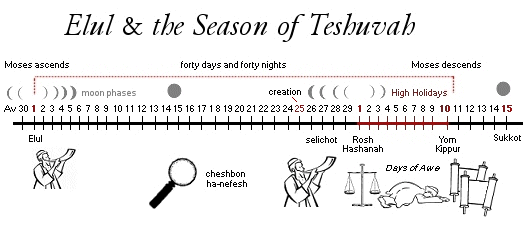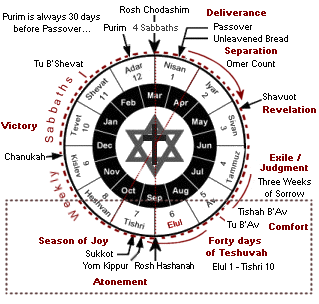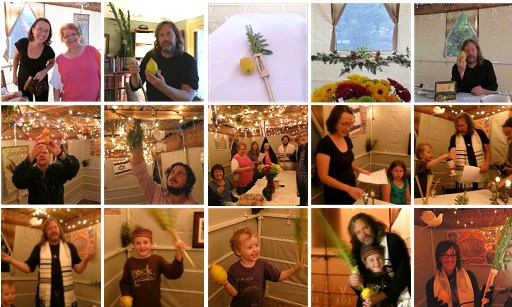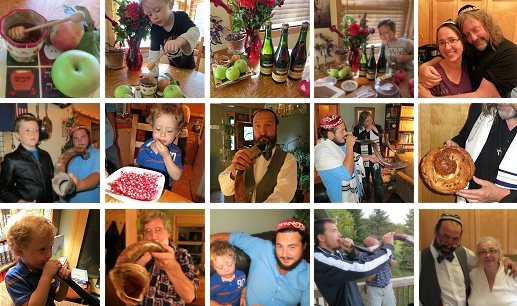|
September 2012 Updates
Fall Holiday Schedule
Note: For site updates, please scroll past this entry....
Preparations for the High Holidays begin a month in advance. This year, the 40-day season of teshuvah (return or repentance) runs from Aug. 17th (Elul 1) until the end of Yom Kippur (Sept. 25th). Just five days after Yom Kippur is the joyous week-long festival of Sukkot ("Tabernacles"), which is immediately followed by the celebration of Simchat Torah. Here is a simple diagram to help you visualize this season of the Jewish calendar:
The following is a list of the fall holiday dates according to the Gregorian Calendar. Note that in accordance with Jewish tradition, all holidays begin at sundown:
- The Month of Elul
When? Aug. 17th - Sept. 15th

According to Jewish tradition the month of Elul represents the time that Moses spent on Sinai getting the second set of tablets after the idolatrous incident of the Golden Calf. Moses ascended on Rosh Chodesh Elul and descended 40 days later on the 10th of Tishri (the end of Yom Kippur). During the month of Elul we sound the shofar every day in anticipation for the Ten High Holy Days. For more information, see this page.
- Rosh Hashanah
When? Sunday, Sept. 16th
Rosh Hashanah (ראש השנה) begins Sunday, September 16th this year (the seventh "new moon" of the Jewish Year) and ends on Tuesday, September 18th. According to traditional Jewish thinking, this holiday commemorates the creation of mankind by God. The Mishnah (earlier part of the Talmud) refers to Rosh Hashanah as the "Day of Judgment" (Yom ha-Din) since all of creation owes allegiance to the Creator and is accountable to Him. The Name Elohim (אֱלהִים) revealed in Genesis 1:1 bespeaks God as the Creator and Judge of the universe. On Rosh Hashanah we stand before God as our personal Creator and Judge. Many Messianic Jews believe that the sound of the shofar on Rosh Hashanah is a symbol of the rapture (ἁρπάζω) of the followers of the Messiah. You can download a free Rosh Hashanah Seder Guide here.

Note: The minor Fast of Gedaliah traditionally is observed on Tishri 3, unless that happens to be a Sabbath (in which case it postponed). This year the sunrise to sunset fast occurs on Wednesday, September 19th.
- Yom Kippur
When? Tuesday, Sept. 25th
Yom Kippur begins an hour before sundown on Tuesday, September 25th. It is customary to eat a late afternoon meal with loved ones (called Seudat Mafseket, a meal of cessation), before the fast begins (the 25 hour fast runs until an hour past sundown on the following day). This is perhaps the most important holiday of the Jewish Year and holds tremendous prophetic significance regarding the Second Coming of Mashiach, the restoration of national Israel, and the final judgment of the world. It is also a day that reveals the High-Priestly work of the Mashiach Yeshua as our Kohen Gadol (High Priest) after the order of Malki-Tzedek (Heb. 5:10, 6:20).

The sound of the shofar at the end of the Yom Kippur minchah (afternoon service) is called gedolah, since it signifies the "sealing of the books" for the coming year.... Yom Kippur prophetically pictures the "Day of the LORD" or the Day of Judgment in Acharit Ha-Yamim (the End of Days).
- Sukkot - Simchat Torah
When? Sun. Sept. 30th - Oct. 8th
Just five days after Yom Kippur marks the start of the seven-day festival of Sukkot (referred to as "Tabernacles" in the Christian tradition). It can be argued that Sukkot is the climax of all the festivals in Scripture.... Everything leads to it as a culmination in God's prophetic plan. Though it is a seven-day festival, Sukkot concludes with an additional holiday called "Shemini Atzeret," on Sunday, October 7th.

Note: Immediately following Sukkot (i.e., after the Shemini Atzeret evening service) we observe Simchat Torah ("Joy of Torah"). On Simchat Torah we conclude, and begin anew, the Torah-reading cycle for the year. To symbolize this, first we read the last portion of Deuteronomy followed by the first chapter of Book of Genesis. This year Simchat Torah occurs on Monday, October 8th.
September 2012 Site Updates
Happy Sukkot 5773!

09.30.12 (Tishri 15, 5773) Last evening we began celebration of the week-long holiday of Sukkot ("Tabernacles") by eating a special meal with some friends in our sukkah, waving our lulavs, and so on. Here are a few pictures from our celebration:
Left-to-right (top): 1. Olga and Lonnie; 2. checking the lulav; 3. lulav / etrog;
4. window decoration in the sukkah; 5. John holding the etrog
(middle): 1. hanging fruit in the sukkah; 2. Peter; 3. ushpizin;
4. Olga lights Yom Tov candles; 5. Judah puts a quarter in the tzedakah box
(bottom): 1. Praise; 2. Josiah waves lulav; 3. Judah; 4. John and Josiah; 5. Mary Beth
The Torah states, "On the first day [of Sukkot] you shall take to yourselves the fruit of the goodly tree, branches of palm trees, boughs of leafy trees and willows of the brook, and you shall rejoice before the Lord your God seven days" (Lev. 23:40). In Jewish tradition, after reciting the Hebrew blessing and shaking the lulav around, it is customary to recite (or sing) the following antiphon from Psalm 136:
הוֹדוּ לַיהוה כִּי־טוֹב כִּי לְעוֹלָם חַסְדּוֹ
ho·du la·Adonai ki-tov, ki le·o·lam chas·do

"Give thanks to the LORD, for he is good,
for his steadfast love endures forever."

Download Study Card
Indeed, is there any better reason to give thanks to the LORD than because of His steadfast love, i.e., His chesed (חֶסֶד)? Is there anything greater than the astounding love of God? Can anything overcome it? Can even the hardness of your own heart somehow veto or negate it's purposes? It was because of His great love that God (יהוה) "emptied Himself" of heavenly glory, becoming clothed in human flesh and becoming disguised a lowly slave (δοῦλος). God performed this act of "infinite condescension" in order to "tabernacle" with us as our "hidden King" (John 1:1,14, Phil. 2:7-8). Your neshama (soul) is the "Shulamite woman" he came to woo so that you might "come into His tent" -- willingly, from the heart (Song of Solomon).
When we receive Yeshua as the Lover of our souls (kabbalat Yeshua), we abide in the hope of love that awaits future consummation in the world to come... Meanwhile, we are "suspended between worlds," though the veil of this world has been rent asunder and we may now appear before the LORD in the realm of the spirit by faith. We can come "boldly" before the Throne of Grace (παρρησίας τῷ θρόνῳ τῆς χάριτος) to find help for our lives (Heb. 4:16). Note that the word translated "boldly" in this verse (παρρησίας) comes from πᾶς (all) + ῥέω (to utter), suggesting that we can speak freely to God and share everything within our heart without fear or shame. We do not need to conceal ourselves from the Divine Light -- any more than we need to perform arabesque rituals or offer any "prescribed prayers" to access Him. We who are trusting in God's sheltering love understand the LORD to be our loving Savior and Redeemer. In our brokenness we can bare our souls before Him without fear ("there is no fear in love" - אין פַּחַד בָּאַהֲבָה). We can express "all our heart" to the LORD and be assured that He will help us in our hour of need (Heb. 4:16).
Shalom and blessings to you all in our Lord Yeshua the Messiah - the One who "tabernacles" with us in the Holy Spirit and who graciously invites all to come within the shelter of His everlasting love. וַיְהִי בְשָׁלֵם סֻכּוֹ וּמְעוֹנָתוֹ בְצִיּוֹן / vayehi v'shalem sukko, u'me'onato v'Tzion: "His sukkah is in Shalem; His place in Zion" (Psalm 76:3). Though this world is surely under divine judgment, those who trust in the LORD can say: יִצְפְּנֵנִי בְּסֻכּה בְּיוֹם רָעָה / yitzpeneni b'sukkoh b'yom ra'ah, "He will conceal me in His sukkah in the day of trouble" (Psalm 27:5).
Whether you have the opportunity to wave the lulav in a Sukkah or not this year, we sincerely wish you a season of joy as you celebrate the sheltering presence of the LORD Yeshua in your life, chaverim... Chag Sukkot Sameach!
 |
The Holiday of Sukkot (Tabernacles)

[ The week-long holiday of Sukkot begins Sunday, September 30th at sundown this year... ]
09.28.12 (Tishri 12, 5773) On the Biblical calendar, the seventh (and final) festival given to Israel is called Sukkot (סֻכּוֹת) or the "Feast of Tabernacles," which begins Sunday, Sept. 30th at sundown this year. Since it immediately follows the Days of Awe and Yom Kippur, Sukkot represents the time of restored fellowship ("at-one-ment") with the LORD, and the sukkah symbolizes God's Presence closely dwelling among His redeemed people as they make their pilgrimage through the desert to Zion.
Yeshua the Messiah did indeed come to "sukkah" (or "tabernacle") with us (see John 1:14) in order to purge away our sins and to redeem us to Himself, and Sukkot also is likely the time of Yeshua's birth. The festival has a prophetic dimension awaiting fulfillment. As the "Day of Ingathering" of the harvest, Sukkot prefigures the gathering together of the Jewish people in the days of the Messiah's reign on earth (Isa. 27:12-13; Jer. 23:7-8). Indeed all of the nations of the earth that survived the Great Tribulation will come together to worship the LORD in Jerusalem during the Feast of Sukkot (Zech. 14:16-17). Sukkot, therefore is a vision of olam haba, the world to come.
Note: For more information about the holiday of Sukkot - including how to observe it, recite the Hebrew blessings, etc., see the linked page, above. Chag Sukkot Same'ach, chaverim!
 |
Abiding in Him...
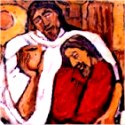
09.28.12 (Tishri 12, 5773) "Abide in me, and I in you..." (John 15:4). Live within God's love for you; let his compassion fill you with great peace. The Name of the Lord, YHVH (יהוה), means He is always present; He will never leave you nor forsake you... Breathe in his Holy Spirit (John 20:22); let your heart become "at-one" with him. Dwell within his all-pervading love and kindness... Open your heart to be His sanctuary. As it is written, the one who dwells in the secret of the ascended one (עֶלְיוֹן) abides in the shadow of Shaddai (שַׁדַּי).
ישֵׁב בְּסֵתֶר עֶלְיוֹן
בְּצֵל שַׁדַּי יִתְלוֹנָן
אמַר לַיהוָה מַחְסִי וּמְצוּדָתִי
אֱלהַי אֶבְטַח־בּוֹ
yo·shev · be·se·ter · El·yon
be·tzel · Shad·dai · yit·lo·nan
o·mar · ladonai · mach·si · u·me·tzu·da·ti
E·lo·hai · ev·tach · bo

"He who dwells in the secret of the ascended one
will abide in the shadow of Shaddai.
I will say to the LORD, "My refuge and my fortress,
my God, in whom I trust."
(Psalm 91:1-2)
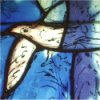
Download Study Card
One of the great Hebrew names of God is El Elyon (אֵל עֶלְיוֹן), often translated as God "Most High." The name first appears in the Torah regarding the mysterious figure of Malki-Tzedek (מַלְכִּי־צֶדֶק), the timeless king and priest of Zion who served "God Most High" (Gen. 14:18). Malki-Tzedek is the first priest (i.e., kohen: כּהֶן) named in the Torah, a mediator who ministered "bread and wine" to our father Abraham - alluding to the sacraments later use to commemorate our Passover redemption. As the timeless king and priest of God, Malki-Tzedek is a revelation of the LORD our God Yeshua before He emptied Himself and made his descent to this world (Phil. 2:7; Heb. 7:3). Yeshua is our great King of Kings and High Priest of the New Covenant, a better covenant that restores the kingship and priesthood back to God Himself (Heb. 7:12). Yeshua is our Atonement with God....
Now the name "Elyon" itself (עֶלְיוֹן) comes from a root word (עָלָה) that means to ascend. For instance, an olah offering (עלָה) is a whole burnt offering that ascends upward to heaven. Calling God Elyon expresses the truth that the LORD our God has ascended on high, the Resurrected One who overcame all the powers of hell and utterly vanquished death's power... In other words, Elyon is a Name for the LORD our God Yeshua.
Notice further that the one who "dwells" in the secret of Elyon abides in an ascended place of rest - being lifted up far above the surrounding world of flux and shadows, and being entirely delivered from the futile law of self-justification (i.e., the law of sin and death). The Hebrew word "dwell" used in this verse is related to the word to lodge or "sleep" (לִין), connecting it with death and resurrection. By dwelling in the death and resurrection of Yeshua, God will shield you with His Presence and make evil powerless before you...
When you "dwell" in the secret of Elyon - the Ascended One - you are concealed by the dark clouds of His Glory, and the Presence of Shaddai overshadows you... The LORD will save you from the ensnaring trap and from the devastating pestilence (Psalm 91:3). By abiding in the truth that God's Presence pervades all things at all times - you become a "stranger" (גֵּר) with the LORD in this world, a "sojourner" (תּוֹשָׁב) who awaits the recompense of the wicked and the healing of the world at the end of the age. "You will tread on the lion and the adder; the young lion and the serpent you will trample underfoot" (Psalm 91:13).
There is a "secret door" that you can enter at any time... This door leads to the realm of the Divine Presence, as David said: shiviti - "I have set the LORD always before me - because He is at my right hand, I shall not be shaken" (Psalm 16:8). But how did David "set the LORD" before Him if He did not "enter the door" by opening his eyes to behold God's hidden Glory?
At any given moment of the day, regardless of our present circumstances, we can awaken to the reality of the Divine Presence and come "boldly before the Throne of Grace." As Yeshua said, "To you it has been given to know the secrets of the kingdom of heaven..." (Matt. 13:11). The Spirit of God always says, "Come, my people, enter your chambers, and shut your doors behind you" (Isa. 26:20). In the secret places of our heart - our "prayer closet" - we appeal to the Hidden Presence to be manifest in the midst of every circumstance of our lives... Let us draw near to lean upon Yeshua now, chaverim! Shabbat Shalom.
 |
Building our Sukkah...
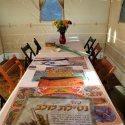
[ The week-long holiday of Sukkot begins Sunday, September 30th at sundown this year... ]
09.28.12 (Tishri 12, 5773) On the Biblical calendar, just a few days after the solemn time of Yom Kippur we celebrate the week long holiday of Sukkot. Since the weather yesterday was especially beautiful, we decided there was no better time to assemble our sukkah (i.e., temporary "tabernacle"). We got everything out of the garage and cleaned up the yard. After we assembled the main structure, we laid the supporting beams for the ceiling and covered them with a bamboo schach (roof). Then we wound Christmas lights around the beams, hung flags from the inner roof, and gathered wall hangings and other decorations for inside the tent. Here are a few pictures of the occasion (you can see more pictures here):
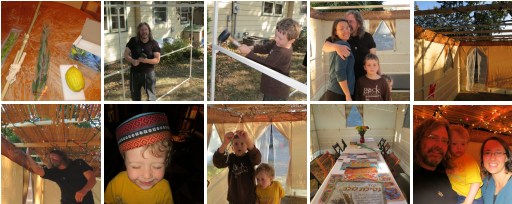 |
Left-to-right (top): 1. Lulav/Etrog; 2. John assembling the frame; 2. Josiah helps out;
4. inside the curtained structure; 5. supporting beams added on top
(bottom): 1. John adjusts schach (roof); 2. Judah wears kipah; 3. the boys help decorate;
4) a view inside the sukkah; 5) we were a bit tired after finishing
 |
Hiddur mitzvah (הִדּוּר מִצְוָה) is a phrase that means "making a commandment beautiful," and we want to make our sukkah a place of beauty, a personal mishkan or "tabernacle." The sages note that the idea behind hiddur mitzvah comes from the great Song of Moses: "This is my God and I will enshrine (נָוָה) Him" (Exod. 15:2). Since we are surrounded by God's clouds of glory - and also by a "great cloud of witnesses" who watch as we walk in faith (Heb. 12:1) - it is only fitting to do our best to enshrine the LORD!
Our lulav -- i.e., the "sukkot boquet" made by binding together one date palm branch (lulav), two willow branches (aravot), and three myrtle branches (hadasim) -- is especially beautiful this year, and the etrog (i.e., citron) is extra large and very fragrant. According to midrash, the fruit that Adam and Eve ate was actually the etrog, and yet this fruit is considered most precious as we celebrate Sukkot. But how would etrog, a symbol of our downfall, be made part of our rejoicing unless we celebrate how God brings blessing out of a curse because of Yeshua our Lord... Only Yeshua is able to redeem us from our past and make all things new!
It is written in Psalm 27, "for he will hide me in his Sukkah in the day of trouble ... and I will offer in his tent sacrifices with shouts (teruah) of joy; I will sing and make melody to the LORD" (Psalm 27:5-6). If all goes well, we will have some "ushpizin" (guests) for the first night of Sukkot on Sunday evening. I wish you could join us over here.... Shalom.
 |
Yom Kippur and Paradox...
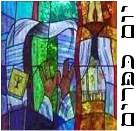
[ The following is related to Yom Kippur, the "Day of Atonement"... ]
09.27.12 (Tishri 11, 5773) During High Holiday services, the Torah section about Yom Kippur that begins "on the tenth day of the seventh month..." (Lev. 23:27-32) is deliberately not read because it includes the grave warning that any one who performs any work on this day would be destroyed [spiritually cut off] from his people (Lev. 23:30). In the Yom Kippur service at the Tabernacle (and Temple), however, the High Priest performed a number of labors that were explicitly forbidden by the Torah, thereby demonstrating Yeshua's statement that the priests "profane the Sabbath and yet are guiltless" (Matt. 12:5). This is not unlike the paradox of the Red Heifer, where the offerer of the sacrifice became defiled through his service to God, but the worshipper who was sprinkled with the sacrificial ashes became purified from contamination with death. Therefore we might better understand how Yeshua, our great High Priest of the new covenant, made Himself sin for us that we might be healed and eternally delivered (2 Cor. 5:21). Just as the service of the High Priest during Yom Kippur transcended the bounds of the law of Moses and yet provided atonement for Israel, so the priestly service of Yeshua transcended the law to fulfill the deeper redemptive purposes of God by providing atonement for the whole world...
Personal Prayer request: I was up all night again with abdominal pain (and other pain)... I hope to see a doctor soon. Thank you for your prayers.
 |
Yom Kippur and Jonah...
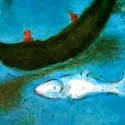
[ The following is related to Yom Kippur, the "Day of Atonement"... ]
09.26.12 (Tishri 10, 5773) The Book of Jonah is traditionally read during the Yom Kippur minchah (afternoon) service because the theme of teshuvah (repentance) is central to the story. In the Pesikta midrash it is written, "Israel said to God, 'Master of the Universe, if we repent, will you accept it?' and God replied, 'Would I accept the repentance of the people of Nineveh, and not yours?'" The sages therefore say that the story of Jonah is recited at this time to remind us that if God could forgive the Ninevites, so He can forgive us, too...
It is noteworthy that Yeshua focused on the "sign of Jonah," that is, Jonah's miraculous deliverance after being entombed in the belly of the fish for three days, to authenticate his own claim to be Israel's Messiah. "Just as Jonah was three days and three nights in the belly of the great fish, so will the Son of Man be three days and three nights in the belly of the earth" (Matt. 12:40). "This is an evil generation. It seeks a sign, and no sign will be given to it except the sign of Jonah the prophet. For as Jonah became a sign to the Ninevites, so also the Son of Man will be to this generation" (Luke 11:29-30). In other words, the story of Jonah foreshadowed the atoning sacrifice of the Messiah, that is, his death, burial and especially his miraculous resurrection on the third day. Just as God brought Jonah back to life after three days in the belly of the earth, so the resurrection of Yeshua from the dead would vindicate his claim to be the Savior and Redeemer of the world. In this way the "Sign of Jonah" and the sacrificial work of Yeshua as our High Priest of the new covenant are connected.
 |
Yom Kippur by Heart...
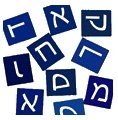
[ The following is related to Yom Kippur, the "Day of Atonement"... ]
09.26.12 (Tishri 10, 5773) The story is told that once a farmer traveled to attend Yom Kippur services but got lost in the woods. As sunset approached, the man was tempted to despair, but he remembered that true service to God is marked by joy and faith, regardless of the present circumstances. He decided, then, to turn his eyes toward heaven. 'Dear God,' he said. 'I have never learned to pray like others have. I have no prayer book, and I am unable to attend a Yom Kippur service... All I really know is the Hebrew aleph-bet. I will recite the letters for You, and You put them together to make the proper words." He then began reciting 'Aleph, Bet, Gimmel, Dalet...' He did this over and over again, full of faith. Later he made his way out of the woods and explained what happened to a sage, who reassured him that above all God prefers sincerity of the heart.
I relate this story to encourage those of you who - for any number of reasons - are unable to attend a Yom Kippur service today... God sees your heart and knows all about you. Rejoice that your atonement is complete in Yeshua, then, and ask God to make "words" from the simple groaning of your spirit. Shalom.
 |
Atonement and God's Love...

[ The following is related to Yom Kippur, the "Day of Atonement"... ]
09.26.12 (Tishri 10, 5773) Most of our deepest anxieties come from the fear of death, whether we are conscious of this or not... For many people, death represents fear of the unknown, fear of being abandoned, fear of being rejected, fear of being separated from others, and so on. I am so glad Yeshua gives us eternal life, which for me is not so much about immortality of the soul as it is being loved and accepted by God... That is what "at-one-ment" means, after all. Because God loves and accepts me, I trust Him to always be present for me, even in the darkest hours, on the other side of the veil, having "prepared a place for me." As Yeshua said, "I tell you the solemn truth, the one who hears my message and believes the One who sent me has eternal life (חַיֵּי עוֹלָם) and will not be condemned, but has passed (i.e., μετά + βαίνω, lit., "crossed over" [עָבַר]) from death to life" (John 5:24). God's love "crosses over" from death to life and now forever sustains me.
Yom Kippur ultimately is about God's love and acceptance. The word for love (i.e., ahavah: אהבה) equals the number thirteen (1+5+2+5=13), but when shared it is multiplied: 13 x 2 = 26, the same value for the Sacred Name (יהוה), i.e., (10+5+6+5=26). Likewise the Hebrew word for "life" is chayim (חַיִּים), is written in the plural to emphasize that life cannot be lived alone but must be shared. Notice that within the word itself are embedded two consecutive Yods (יי), representing unity in plurality (Yod-Yod is an abbreviation for YHVH, also indicating the "deep Akedah" of Father and Son). God gave up His life so that we can be in relationship with Him, that is, so that we can be "at-one" with His heart for us. Whatever else it may mean, the word "atonement" (i.e., kapparah, "covering," "protection," "purification," "forgivenenss") is about accepting God's heart for you, and if you miss that, you've missed the entire point of this season. Yom Kippur, then, is a day to celebrate God's love for us. May His great Name be praised, honored, extolled, and glorified forever and ever. Amen.
 |
Yom Kippur and the Gospel...
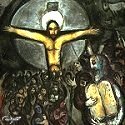
[ The following is related to Yom Kippur which begins sundown this evening... ]
09.25.12 (Tishri 9, 5773) It is vital to remember that the detailed instructions for constructing the Tabernacle were "according to the pattern" (תַּבְנִית) given to Moses at Sinai (Exod. 25:9). In other words, the tent (Mishkan), the furnishings such as the Table of the Bread of Presence (הַשֻּׁלְחָן לֶחֶם פָּנִים), the golden Menorah (מְנוֹרָה), the Bronze Altar for sacrifices (מִזְבֵּחַ הַנְחשֶׁת), the vessels, and so on, were first shown to Moses before they were created. They were copies or "shadows" that were intended to prefigure the eternal reality of the Heavenly Tabernacle itself. The entire sacrificial system was metaphorical, if you will, and pointed to a deeper reality that transcended the earthly sphere. Even the yearly Yom Kippur ritual was never intended to remain into perpetuity but pointed to something more profound -- namely, the greater avodah (ministry) of Yeshua, the Kohen Gadol of the New Covenant (Heb. 9). Indeed, if the older covenant had been sufficient to provide a permanent solution to the problem of our sin, there never would have been need for a new covenant to supersede it (Hebrews 8:7). For more on this very important topic, please see "Yom Kippur and the Gospel."
Note: In light of the finished work of Yeshua on our behalf, we do not wish to be "sealed for a good year" (i.e., g'mar chatimah tovah) in the book of life during this season... In light of the sacrifice of Yeshua this is chillul Hashem - a desecration of the Name of the LORD. Instead we trust that our names are written and sealed for good because of His sacrifice on our behalf... Likewise you are at liberty to fast so that you might identify with the Jewish people and to intercede on their behalf, but you should not fast in an attempt to atone for your sins or to appeal to God for grace apart from the finished work of Yeshua on the cross.
Shalom chaverim... I wish you all great joy and happiness in the precious atonement secured for you through the sacrifice of Yeshua our Messiah. May you feel "at-one" with the Father's heart for you; may you know the great truth of God's profound passion for you. Amen.
 |
Mystery of the Scapegoat...

[ The following is related to Yom Kippur which begins sundown this evening... ]
09.25.12 (Tishri 9, 5773) "When the Messiah appeared as High Priest of the good things to come, then, through the greater and more perfect Tabernacle (μείζονος καὶ τελειοτέρας σκηνῆς) which is not made with human hands (that is, not of this creation), he entered into the Kodesh Kodashim (Holy of Holies) once and for all - not by means of the blood of goats and calves but by means of his own blood, thus securing for us eternal redemption" (Heb. 9:11-12). The Levitical system of worship was a "shadow" (σκιά) of a greater reality to come (Heb. 10:1), since "it is impossible (ἀδύνατος) for the blood of bulls and goats to take away (i.e., ἀφαιρέω, used to translate the Hebrew כָּרַת, to "cut off") sins" (Heb. 10:4). For more on this subject, see "The Mystery of the Scapegoat."
Also note that Hebrews 9:8-9 indicates that the way to the Holy of Holies (i.e., kodesh hakodashim: קדֶשׁ הַקֳּדָשִׁים) was not yet open as long as the "outer tent" still stood (i.e., the Levitical priesthood as the ritualistic expression of the covenant made at Sinai), since that was symbolic of "the present age," or the "dispensation that was passing away" even as the Brit Chadashah (new covenant) was being established (Hebrews 8:13). For more on this subject, see "The Parochet Rent in Two."
 |
The Necessity of Blood Atonement

[ The following is related to Yom Kippur which begins sundown this evening... ]
09.25.12 (Tishri 9, 5773) The priesthood of Yeshua is said to be after the "order of Malki-Tzedek," based on a direct oath from God, that predates the operation of the Levitical priesthood. This is not unlike the King/Priest office that Moses held when he commanded the sacrifice of the Passover lambs during the Exodus. The korban pesach (sacrifice of Passover) was not originally instituted through the Levitical priesthood (i.e., the Mishkan), but likewise predated the giving of the law to the priests. It is no coincidence that Yeshua explicitly referred to this (pre-Levitical priesthood) event to speak of His role as Seh Elohim, the Lamb of God who takes away the sins of the world (John 3:1-12).
The midrash describes how Adam reacted when he first saw the setting sun, on the day he was created. "Woe is me," he exclaimed, "Because of my sin the world grows dark and returns to primordial emptiness and formlessness. This must be the death I have been sentenced to!" He stayed up all night, fasting, crying, doing teshuvah, and God then reassured him. Therefore traditional Yom Kippur services end with confession and a final appeal: "Forgive us, please, for the day is waning..." After this, the great shofar blast is sounded, tekiah gedolah, to recall the sacrifice of Isaac offered by Abraham...
Note: For more on this, see "Rabbis who deny blood atonement."
 |
Behold the Goat of God!

[ The following is related to Yom Kippur which begins sundown this evening... ]
09.25.12 (Tishri 9, 5773) Yeshua as the "Lamb of God" pictures personal redemption from slavery to Satan and freedom from the wrath of God. This is the Passover/Exodus connection. By means of Yeshua's shed blood and broken body, the wrath of God passes over us and we are set free to serve God.... Yeshua as the "Goat of God" pictures both personal cleansing (i.e., "propitiation" or "expiation" for our sins: the Greek word (ἱλαστήριον) is used in the LXX for the kapporet (Mercy Seat) in the Holy of Holies which was sprinkled with the blood of the sacrifice on Yom Kippur) as well as national teshuvah and cleansing for Israel at the end of the age. For more on this, see the Yom Kippur article, "Behold the Goat of God."
Atonement and the Cross...
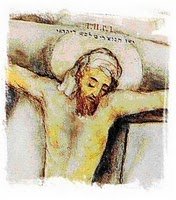
[ The following is related to Yom Kippur which begins sundown this evening... ]
09.25.12 (Tishri 9, 5773) The proclamation of the cross of Yeshua as the sole means of atonement with God is inherently offensive to the idea of "meritocracy" taught in karma-based religions. The underlying issue has to do with the question about how a person obtains righteousness before the LORD God of Israel... Is it through completely trusting in God's forgiveness and salvation given in the Messiah, or is it through performing enough mitzvot (good deeds) and hoping for the best? Let it be boldly said that the symbol of faith for followers of Yeshua is the cross, not the scales...
"But I am afraid that as the serpent deceived Eve by his cunning, your thoughts will be led astray from a simple (ἁπλότης, "untangled, unwoven") devotion to the Messiah. For if someone comes and proclaims another Yeshua than the one we proclaimed, or if you receive a different spirit from the one you received, or if you accept a different gospel from the one you accepted, you put up with it readily enough" (2 Cor. 11:2-3).
"There are some who trouble you and want to distort (μεταστρέφω, to "turn around") the gospel of Messiah. But even if we or an angel from heaven should preach to you a gospel contrary to the one we preached to you, let him be accursed (ἀνάθεμα). As we have said before, so now I say again: If anyone is preaching to you a gospel contrary to the one you received, let him be accursed (ἀνάθεμα). For am I now seeking the approval of man, or of God? Or am I trying to please man? If I were still trying to please man, I would not be a servant of Messiah" (Gal 1:7-10).
You will find me to be a ferocious defender of the grace of God given in Yeshua, despite the fact that I love the Torah and esteem it with all my heart.... Shalom.
 |
Yom Kippur and Malki-Tzedek

[ The following is related to Yom Kippur which begins sundown this evening... ]
09.25.12 (Tishri 9, 5773) Though Yeshua is our great High Priest whose ministry far surpasses the ritual expression of the lawcode given at Sinai, since it mediates a better covenant based on better promises (Heb. 8:6), nevertheless we still eagerly await the completion of our redemption, and we "have great sorrow and unceasing anguish in our hearts" for the deliverance of the Jewish people and the atonement of their sins (Rom. 9:1-5; 10:1-4; 11:1-2, 11-15, 25-27).
But regarding the nature of Yeshua's work as our Mediator, our High Priest, understand that the New Covenant really is new, at least with regard to the older covenant given at Sinai. Indeed, the Levitical priesthood "made nothing perfect" and therefore a "new priesthood" was required to finally reconcile us back to God (Psalm 110:4). As it is written, "For when there is a change (μετατιθεμένης) in the priesthood (הַכְּהוּנָּה), there is necessarily (ἀνάγκη) a change (μετάθεσις) in the law as well" (Heb. 7:12). The word translated "change" here comes from the verb μετατίθημι (from meta, "after" + tithemi, to "set") which would be better translated as "transposed." The idea is the priesthood reverted back to the original priesthood of Zion (i.e., given through the priesthood represented by Malki-Tzedek) and therefore required a corresponding "transfer" of authority (μετάθεσις) to the original kingship as well (since Malki-Tzedek was the original king of Zion). Yeshua is our great High Priest after the order of Malki-Tzedek (Heb. 5:10, 6:20; 7:1-28), just as He is our King and the final authority of the Torah. Those who follow Him are called to be mamlekhet kohanim v'goy kadosh, "a kingdom of priests and a holy nation" forever (Exod. 19:6, 1 Pet. 2:9, Rev. 1:6, 5:10). Followers of Yeshua have an altar "from which those who serve in the Tabernacle are not permitted to eat" (Heb. 13:10). The Levitical priesthood expresses the Torah of the Covenant of Sinai (בְּרִית יְשָׁנָה), just as the greater priesthood of Yeshua expresses the Torah of the New Covenant (בְּרִית חֲדָשָׁה). And just as Moses "stood outside" the religious system to declare revelation, so Yeshua was a prophet "like unto Moses" who mediated the truth of the new covenant to Israel and to the entire world...
 |
The LORD our Mashgiach

[ The following is related to Yom Kippur which begins sundown this evening... ]
09.25.12 (Tishri 9, 5773) During the season of teshuvah, we make extra effort to remind ourselves of the kingship of the Lord and of our responsibility to live before His Presence in the truth, as His royal children. As it is written, "The LORD looks down from heaven; He sees all the children of man; from where He sits enthroned He beholds all the inhabitants of the earth. He is the One who fashions the hearts of them all and discerns all their deeds."
מִשָּׁמַיִם הִבִּיט יְהוָה
רָאָה אֶת־כָּל־בְּנֵי הָאָדָם
מִמְּכוֹן־שִׁבְתּוֹ הִשְׁגִּיחַ
אֶל כָּל־ישְׁבֵי הָאָרֶץ
הַיּצֵר יַחַד לִבָּם
הַמֵּבִין אֶל־כָּל־מַעֲשֵׂיהֶם
mi·sha·ma·yim · hib·bit · Adonai
ra·ah · et · kol · be·nei · ha·a·dam
mi·me·khon · shiv·to · hish·gi·ah
el · kol · yo·she·vei · ha·a·retz
hai·yotz·er · ya·chad · lib·bam
ha·me·vin · el · kol · ma·a·sey·hem

"The LORD looks down from heaven; He sees all the children of man;
from where He sits enthroned He beholds all the inhabitants of the earth"
(Psalm 33:13-15)

The LORD "looks down from heaven," not in some general way, but He "beholds" each person individually – he looks directly and personally upon each soul. God discerns each person's actions and inner intentions with perfect clarity; He completely comprehends every outcome of every action in the entire universe, simultaneously and in all possible states. The LORD is the Mashgiach (מַשְׁגִּיחַ), the personal Supervisor and Overseer of each human soul. And though our God truly is the great King over all, the Master of the Universe and Sovereign on High, his greatness reaches down to the lowest of depths, humbly appealing for any who are willing to turn to him, to choose life, to receive his love and grace.
 Listen to the Shofar (click speaker icon) Listen to the Shofar (click speaker icon)
The Clue of Loneliness...

09.24.12 (Tishri 8, 5773) Whenever you feel lonely, instead of attempting to escape through various forms of distraction, try to discover the underlying source of the feeling. This is a task for the heart, not the head. The pain may come from a place of emptiness, and therefore you can regard it as an invitation to come to God for comfort. The Lord understands; he knows the number of the hairs on your head, and he promised: "I will not leave you as orphans; I will come to you" (John 14:18). Take a moment to breathe deeply and reawaken to the indwelling Divine Presence today...
Pressing on in faith...
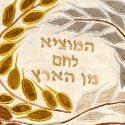
09.24.12 (Tishri 8, 5773) "Love suffers long and is kind..." Have patience with all things, but most of all with yourself. We must "endure ourselves" along the way, often learning hard lessons of our own insufficiency. Have faith that despite all your imperfections, all your defects of character, and your overall weakness of heart, God is indeed at work in your darkness, molding and shaping you to bear witness of His glorious power to save the soul. The LORD upholds your hand; his grace and love will help you persevere, giving you the will to press on in hope. Never give up, chaverim!
מֵיְהוָה מִצְעֲדֵי־גֶבֶר כּוֹנָנוּ
וְדַרְכּוֹ יֶחְפָּץ
כִּי־יִפּל לא־יוּטָל
כִּי־יְהוָה סוֹמֵךְ יָדוֹ
me·Adonai · mitz·a·dei · ge·ver · ko·na·nu
ve·dar·ko · yech·patz
ki · yi·pol · lo · yu·tal
ki · Adonai · so·mekh · ya·do

"The steps of a man are established by the LORD, and He delights in his way;
though he fall, he shall not be cast headlong, for the LORD upholds his hand."
(Psalm 37:34-24)

Personal Prayer Request
The sages remark that the one who prays for another and who is in need of the same thing is answered first (Talmud, Bava Kamma). For example, when the prophet Job prayed for his friends, God restored Job's own fortunes (Job 42:10). There is a shared blessing when we pray for others, as King David said in Psalm 35:13: "may what I prayed for happen to me!" (literally, tefillati al-cheki tashuv - "may it return upon my own breast"). I mention all this to humbly ask for your prayers: I am in need of physical healing, chaverim. God knows the issue. Thank you so much. - John
Parashat Ha'Azinu (האזינו)
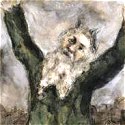
09.24.12 (Tishri 8, 5773) Every year during the High Holidays we read parashat Ha'azinu, the great prophetic song that Moses was commanded to teach the Jewish people before he died. In the Sefer Torah (Torah Scroll), the song is written in a stylized two-column format with extra spaces. Each line of the shirah (song) is matched by a second, parallel unit (Talmud: Shabbat 103b).
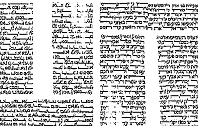 |
The Ha'azinu reminds us that who we listen to ultimately decides our fate. It begins, "Give ear, O heavens (הַאֲזִינוּ הַשָּׁמַיִם), and I will speak, and let the earth hear (וְתִשְׁמַע הָאָרֶץ) the words of my mouth" (Deut. 32:1). The word ha'azinu (הַאֲזִינוּ) comes from verb azan (אָזַנ), as does the Hebrew word for "ear" (i.e., ozen: אזֶן). The Midrash Rabbah says that the ear (אזֶן) gives life to all the organs of the body. How so? By listening (שׁמע, shema) to the Torah. This idea is repeated in the New Testament: "Faith comes from listening to the Word of God" (Rom. 10:17). The Word of God (דְּבַר־אֱלהִים) is our very life, chaverim. Hearing and obeying are linked, and "hearing" the messages of this corrupt world can eventually make you into an enemy of God Himself (James 4:4). The world always speaks its message to members of its "crooked and twisted generation" (Deut. 32:5).
The Ha'azinu is one of two songs in the Torah attributed to Moses, the other being Shirat ha-yam (i.e., the Song of the Sea) in Exodus 15. Unlike the earlier song of praise to the LORD for the great miracle of redemption, this song foretells Israel's entire history (past, present, and the future redemption) and warns the people not to stray from the path that God had commanded. Structured in the form of an "oracle," the song contains Moses' final words of prophecy before he died which undoubtedly influenced the later prophets, especially Jeremiah and Isaiah, as they delivered their messages to the Jewish people...
Note: You can download the free Shabbat Table Talk for Ha'azinu here....
 |
Yom Kippur and the Name

[ The following is related to Yom Kippur which begins Tuesday, Sept. 25th at sundown... ]
09.23.12 (Tishri 7, 5773) Yom Kippur was the only time when the High Priest could enter the Holy of Holies and call upon the Name of YHVH (יהוה) to offer blood sacrifice for the sins of the people. This "life for a life" principle is the foundation of the sacrificial system and marked the great day of intercession made by the High Priest on behalf of Israel. For this reason it was also called the "Day of God's Mercy," or the "Day of God's Name." This alludes to the revelation of the Name YHVH (יהוה) and the attributes of God's Compassion after the sin of the Golden Calf (Exod. 34:6-7). How much more, then, is Yom Kippur the "Day of Yeshua's Name" since He secured for all of humanity everlasting kapparah (atonement)? Yeshua the Messiah is Moshia ha'olam (מוֹשִׁיעַ הָעוֹלָם), the Savior of the world; He alone possesses the "Name above all other Names" (Phil. 2:9-10; Acts 4:12). It is altogether fitting, then, that God's "hidden Name" (i.e., shem ha-meforash: שֵׁם הַמְּפרָשׁ) was proclaimed before the kapporet (the cover of the Ark of the Covenant) in the Holy of Holies while atonement for our sins was made through the sacrificial blood.
This gives us a whole new perspective on Paul's words (Rom. 10:9): "if you confess with your mouth that Yeshua is LORD (יהוה) and believe in your heart that God raised Him from the dead (i.e., that his blood was shed and presented on your behalf upon the heavenly kapporet), then you will be saved (that is, you will be reconciled to God and made a partaker of the atoning work of Yeshua). Surely the Apostle Paul, a zealous rabbi who diligently studied Torah in Jerusalem under Rabbi Gamaliel (who was himself the grandson of the renowned Rabbi Hillel the Elder), understood the theological implications when he stated that the prophecy: "And it shall come to pass that everyone who calls on the Name of the LORD (בְּשֵׁם יְהוָה) shall be saved" (Joel 2:32) applied directly to Yeshua (Rom. 10:10).
 |
Shabbat Shalom to you...
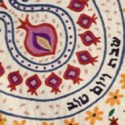
09.21.12 (Tishri 5, 5773) This Shabbat is called "Shuvah" because we are reminded to always turn (shuv) to God in repentance (teshuvah). It is my prayer and hope that each of us will indeed draw near to God for life. May the LORD God heal you, body and soul; may He ease your pain, increase your strength, and release you from all your fears. May blessing, love, joy, and true shalom surround you and fill you in the love of Yeshua our Savior. Wishing you teshuvah shlemah b'ahavat Yeshua - "a complete turning in the love of Jesus." Shabbat Shalom and may the love of God forever be your portion and strength. Amen.
Teshuvah and Confession...
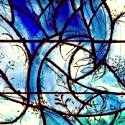
09.21.12 (Tishri 5, 5773) Part of the process of teshuvah - of turning to God - is turning to yourself, that is, learning to honestly observe yourself. Often it is not that we sometimes entertain bad thoughts, but rather we engage in a process of bad thinking, or more accurately, we unquestioningly accept assumptions based on fear and fantasy. Because of this, our reasoning becomes distorted and we lose our ability to see what is real. We then "play god" by justifying ourselves, unaware how we are being driven by fear and a profound sense of inadequacy. The remedy is to change your thinking, to question the assumptions at work in your reasoning, and to gain new perspective. For example, instead of seeing angrily, see your own anger and then ask what really lies behind it. Is it pride? fear? hurt? Look deeper and then come to God... Confession means making peace with reality, "owning" the truth about what's inside your heart. Often we do not find lasting deliverance because we fail to see the real issue. You can pray all day to be free from lust, for example, but the real issue might be fear of intimacy or fear of rejection, and so on.
חַטָּאתִי אוֹדִיעֲךָ וַעֲוֹנִי לא־כִסִּיתִי
אָמַרְתִּי אוֹדֶה עֲלֵי פְשָׁעַי לַיהוָה
וְאַתָּה נָשָׂאתָ עֲוֹן חַטָּאתִי סֶלָה
cha·ta·tee · o·dee·a·kha · va·a·vo·nee · lo · khee·see'·tee
a·mar'·tee · o·deh · a·lei · fe·sha·i · la·do·nai
ve·a·tah · na·sa'·ta · a·von · cha·ta·tee' · se'·lah

"I acknowledged my sin to you, and I did not cover my iniquity;
I said, "I will confess my transgressions to the LORD,"
and you forgave the iniquity of my sin. Selah.
(Psalm 32:5)

Undoubtedly the root of a lot of suffering comes from the vain attempt to fill the infinite emptiness we feel with something other than God. The pride of the ego puts the self as the center, but this comes from a place of inner poverty... We demand to be the center because we are afraid we are nothing. Only the Lord can save us from ourselves - and we rely on Him to correct our thinking and show us the way of inner honesty and truth:
הֵן־אֱמֶת חָפַצְתָּ בַטֻּחוֹת
וּבְסָתֻם חָכְמָה תוֹדִיעֵנִי
hen · e·met · cha·fatz'·ta · va·too·chot
oov·sa·tum · chokh·mah · to·dee·ei'·nee

"Behold, You delight in truth in the inward being,
and you teach me wisdom in the secret heart."
(Psalm 51:6)
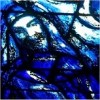
The unexamined life -- especially as a follower of Yeshua -- is not worth living, and the practice of suppressing the truth about our sinful condition can lead to self-deception and even death (1 Cor. 11:30). "If we say we have no sin, we deceive ourselves, and the truth is not in us; if we confess our sins, he is faithful and just to forgive us our sins and to cleanse us from all unrighteousness" (1 John 1:7-8). "Therefore, confess (ἐξομολογέω, lit. 'confess out') your sins to one another and pray (εὔχομαι) for one another, that you may be healed. The prayer of a righteous person (tzaddik) works great power" (James 5:16).
Notice the link between confessing our sins and praying for one another with healing... Being yashar - honest and upright - produces spiritual power and life. The word translated "pray" (euchomai) means to "wish (εὐχὴ) for oneself (or for another) the good." Prayer is always reciprocal, as King David said in Psalm 35:13: "may what I prayed for happen to me!" (literally, tefillati al-cheki tashuv - "may it return upon my own breast").
We must begin by asking God for courage and strength... We must let go of the fear that we will discover the truth about who we really are -- about what we've done, what we've thought, about who we've allowed ourselves to become. Confession (ὁμολογία) means bringing yourself naked before the Divine Light to agree with the truth about who you are. Indeed, the word homologeo literally means "saying the same thing" - from ὁμός (same) and λόγος (word). We need to confess the truth if we are to be free from the pain of the past. When King David wrote, "The LORD is my Light and my salvation; whom shall I fear? (Psalm 27:1), he implied that he should even be free of fear of himself and of his past.... We also need to understand our sin in relationship to the wounds of the Savior, since without that connection, our repentance will be vain indeed....
 |
Yom Kippur and Jubilee...

[ The following is related to Yom Kippur and the "Season of Repentance"... ]
09.21.12 (Tishri 5, 5773) According to Jewish tradition, it was on the 10th of Tishri that Moses descended from Sinai with the second set of tablets, his face radiant with the revelation of the Name YHVH (יהוה), and his heart fully convinced Israel was forgiven for the sin of the Golden Calf. This day was later called Yom Ha-kippurim (יוֹם הַכִּפֻּרִים), the "Day of Atonement," a term that has the same numeric value as the Hebrew word for "year," i.e., shanah (שָׁנָה). Yom Kippur also marked the time of the Yovel (יוֹבֵל), or the "Year of Jubilee," when a great shofar blast would be sounded throughout all the land to proclaim liberty: all debts were canceled and all slaves were set free (Lev. 25:9). Therefore we again note that Yom Kippur is indeed a 'day like Purim' (i.e., יוֹם, "day" + כְּ, "like" + פֻּרִים, "purim"), since it represents the season to celebrate our deliverance from sin....
The question is raised why Yom Ha-kippurim is spelled in the plural (יוֹם הַכִּפֻּרִים) rather than in the singular (יוֹם כִּפּוּר). Why do we call it the Day of Atonement rather than the Day of Atonements? Perhaps it is stated in the plural to allude to the two great atonements by the LORD: that of the individual believer in Messiah during the Age of Messiah, and that of national Israel at the outset of the Age of the Kingdom.
 |
Deliver us from Perfection...

09.21.12 (Tishri 5, 5773) "Forgive as we forgive..." Refusing to forgive yourself is to deny forgiveness from others. Forgiving yourself means admitting that you act just like other people, that you are human, and that you are in need of reconciliation yourself. We have to move on, past the shame, to turn back to hope. As a Yiddish proverb puts it, "You are what you are, not what you were..." Teach me to be kind to myself, Lord; deliver me from the hidden pride that believes I am supposed to be "perfect." Help me to understand that by forgiving myself, by releasing myself from perfectionism and pride, I am made free to be transformed by your compassion and love.... Amen.
"Now here is my secret: I tell it to you with an openness of heart, and I pray you are in a quiet room as you read these words. My secret is that I need God - that I can no longer make it alone. I need God to help me give, because I seem no longer capable of giving; to help me be kind, as I no longer seem capable of kindness; to help me love, as I seem beyond being able to love." - Douglas Coupland
Prayer in Loneliness...

09.21.12 (Tishri 5, 5773) "Help me, Lord, I am hurting; my pain drives me inward and I feel alone... Help me to trust someone and to open my heart; deliver me from the fear of being rejected... But if there is no one who will take time to listen, or if I cannot find the courage to entrust the secret of my inner pain to another, then please hear me, O God - hear my inward cry and heal me... May I never be ashamed; may I never grow bitter; may my sorrow lead me from strength to strength, and may you use my suffering for good. Amen".
קוֹלִי אֶל־אֱלהִים וְאֶצְעָקָה
קוֹלִי אֶל־אֱלהִים וְהַאֲזִין אֵלָי
ko·li · el · E·lo·him · ve·etz·a·kah
ko·li · el · E·lo·him · ve·ha·a·zin · e·lai

"My voice is to God, and cries out,
my voice is to God, and He hears me"
(Psalm 77:1)

Teshuvah and God's Love...

[ The following is related to Yom Kippur and the "Season of Repentance"... ]
09.20.12 (Tishri 4, 5773) The message of the gospel requires that you regard yourself as worth dying for, that you are God's friend... "There is no greater love than this: that someone lay down his life for his friends" (John 15:13). God demands that you regard yourself as worth the sacrifice of his beloved son Yeshua in your place; he demands that you understand how dear you are to his heart. The LORD sees something of such great value in you that he was willing to suffer and die to redeem it from loss... Just as the kingdom of God is a "pearl of great price," so you are a pearl of great price to God. What grieves and angers God is the refusal to believe that you are someone of infinite importance to him.
Of course this does not mean that we are "perfect" people, and indeed the test of faith means learning to "accept that you are accepted" despite who you are, despite your sins, and to patiently "endure yourself" while God continues his transformation of your inner life. Meanwhile regard your sins and defects of character in light of the cross of Messiah, and never despair over yourself apart from seeing God's outstretched arms for you... When you understand that your sin was accepted into the stricken heart of Yeshua on your behalf, you see it rightly - and the wonder and glory of God's love for us is magnified....
The mere conviction of sin is not the same thing as repentance. We have to step beyond a troubled conscience and have our sin crucified by God's love and grace... Grace is therefore essential to genuine repentance, since moral reformation is never enough. "When Christ calls a man, he bids him come and die." We must be humbled so that we can receive. God gives us bitter experience of our inadequacy to call us to return to him. Only God can kill the power of sin within our hearts. We speak of teshuvah, teshuvah, teshuvah during this season, but there is something on the "other side of teshuvah" that is the goal of it all. Conviction of sin is not an end in itself, but rather newness of life...
Note: For more on this, see "Teshuvah and God's Love."
 |
Yom Kippur and Purim

[ The following is related to Yom Kippur and the "Season of Repentance"... ]
09.20.12 (Tishri 4, 5773) How is the solemn time of Yom Kippur related to the holiday of Purim? In Hebrew, Yom Kippur is spelled Yom Kippurim (יוֹם כִּפֻּרִים), which can be read a 'day like Purim' (i.e., יוֹם, "day" + כְּ, "like" + פֻּרִים, "purim"), suggesting that it is a time to celebrate deliverance from our enemies. And since the guilt of our sins and the judgment of death are our two greatest enemies, the great day on which Yeshua sacrificed Himself on the cross is truly the greatest "Purim" of all, because through His loving intervention we are eternally delivered from condemnation and are given everlasting atonement.
According to some traditions, the day after Yom Kippur used to be called "The Day of God's Name." This alludes to the revelation of the Name YHVH (יהוה) and the attributes of God's Compassion after the sin of the Golden Calf (Exod. 34:6-7). How much more, then, is Yom Kippur the "Day of Yeshua's Name" since He secured for all of humanity everlasting kapparah (atonement)? Yeshua the Messiah is Moshia ha'olam (מוֹשִׁיעַ הָעוֹלָם), the Savior of the world; His indeed is the "Name above all other Names" (Phil. 2:9-10; Acts 4:12). How fitting, then, that His Name was announced in the Holy of Holies before the Father...
 |
Freedom from Worry...
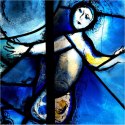
09.19.12 (Tishri 3, 5773) The sages say, "To worry is a sin. Only one sort of worry is permissible; to worry because one worries!" Indeed, if you find yourself worrying, ask yourself what it is that you are trusting... In most cases, anxiety arises from the failure to make a decision, that is, to become inwardly divided and fragmented. When we remind ourselves what is real, abiding, and true we will be delivered from our fears....
Take comfort that your Heavenly Father sees when the sparrow falls; he arrays the flower in its hidden valley; and he calls each star in the heavens by name. More importantly, the Lord sees you and understands your struggle. He separated you from your mother's womb and calls you to follow him in grace. He will never leave nor forsake you. The LORD "is the healer of the brokenhearted and the One who binds up their sorrows."
הָרפֵא לִשְׁבוּרֵי לֵב וּמְחַבֵּשׁ לְעַצְּבוֹתָם
מוֹנֶה מִסְפָּר לַכּוֹכָבִים לְכֻלָּם שֵׁמוֹת יִקְרָא
ha-ro·fei · lish·vu·rei · lev · u'me·cha·besh · le'atz·tze·vo·tam
mo·neh · mis·par · la·ko·kha·vim · le·khu·lam · she·mot · yik·ra

"He is the healer of the brokenhearted and the One who binds up their sorrows.
He counts the number of the stars, to all of them He assigns names."
(Psalm 147:3-4)

Download Study Card
It is tragic that the great need of the soul -- to be seen and acknowledged as worthy by God -- can devise worry and even dread within the heart... Faith requires us to courageously press through the fear of being seen by God to take hold of the assurance that He loves us -- despite the fact that we are seen by Him... Many people resist coming to God because they are afraid of being seen by Him; we must encourage them to persevere and boldly pass through the veil to take hold of the love of God that overcomes His judgment. This is part of the great Yom Kippur message we have in Yeshua....
Something More is Needed...
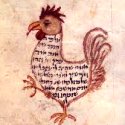
[ The following is related to Yom Kippur and the "Season of Repentance"... ]
09.19.12 (Tishri 3, 5773) A young man came to the Riziner and asked to be ordained as a Rav (Chassidic religious leader). The Riziner inquired regarding his daily conduct, and the candidate replied: "I always dress in white; I drink only water; I place tacks in my shoes for self-mortification; I roll naked in the snow; and I order the synagogue caretaker to give me 40 lashes daily on my bare skin." . . . Just then a white horse entered the courtyard, snorted, drank water, and began rolling in the snow. "Observe," said the Riziner. This creature is white, it drinks only water, it has nails in its shoes, it rolls in the snow, and it receives more that 40 lashes a day. Still, it is nothing but a horse."
And is this not the essence of the matter - that we are justified (judicially, "legally" justified (just-if-I'd never sinned; just-if-I'd always obeyed) by God by trusting in the finished work of Yeshua on our behalf, in our place, for our benefit? Otherwise we might not laugh at this story and regard it as comical, and we might even commend the candidate for undergoing such rigor to please God by means of his own efforts... The message of the gospel - the true gospel, or the "good news" - is that we are both declared "not guilty" and imputed righteousness by means of trust. This is not "theological" as much as it's "ontological" - it has to do with who we really are in Messiah, that is, our identity based on the miracle of our union with Yeshua's sacrifice for our sin (as well as our victory over its accusation and power). If we deny this, if we lay some claim or other to the idea that we are to merit salvation by means of our "religious observance," then we deny the grace of God and abandon Yeshua, because we say that He died in vain (Gal. 2:21).
Trusting in anything for your acceptance in God's eyes other than the finished work of Yeshua performed on your behalf constitutes sin... And that of course includes apparently good things such as attending religious services, performing various religious rituals, fasting, saying public prayers, and so on. Religion is not the answer. We frustrate the grace of God by saying that righteousness can come from the law (i.e., the ego's principle of justification), since this directly implies that Yeshua died in vain.
 |
Prayer and Passion...
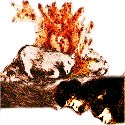
09.19.12 (Tishri 3, 5773) "You have not because you ask not..." We are to pray fervently - behkol levavkha - "with all your heart," bekhol nafshekha, "with all your soul," and bekhol me'odekha - "with all your 'muchness.' It is inner fervor, inner passion, and strength of conviction that "avails much" and works out divine power (James 5:16). When we "lift up our soul," our thoughts and affections ascend heavenward, like a whole burnt offering, before the very Throne of God. We leave behind the realm of mortal fears that weary the countenance and instead "lift up our eyes unto the hills," that is, look to the ascended LORD of Glory, the Master of the Universe, who reigns over all. We turn to the LORD in simple faith; drawing near in full assurance of His love and care for us...
It has been said that whatever you do, do with all your heart -- and that especially pertains to prayer. Indeed, prayer without passion is lifeless and powerless, like a body without a soul... The sages say, "Gold and silver become refined through fire. If you feel no sense of improvement after you pray, you are either made of base metal or your prayer was cold." May God set our hearts afire with passion for Him....
The Spirit of God's love calls out, "Seek Me and live" (Amos 5:4). If you are feeling empty today, ask God to feed you with His life-giving bread. Seek the LORD and His goodness. He is faithful and true and will surely answer the sincere cry of the heart. As it is says, "You will desire me and find Me, when you search for Me with all your heart..."
וּבִקַּשְׁתֶּם אתִי וּמְצָאתֶם
כִּי תִדְרְשֻׁנִי בְּכָל־לְבַבְכֶם
u'vik·kash·tem · o·ti · u·metz·a·tem
ki · tid·re·shu·ni · be·khol · le·vav·kem

"You will desire me and find me
if you search for me with all your heart"
(Jer. 29:13)

We will find God desirable when we earnestly search for Him, but not the other way around. In other words, if you do not search for God bekhol levavkha - "with all your heart" - then you will not find Him, because He (alone) answers the cry of the heart for real love.
The rebbe's grandson, Yechiel Michel, was playing hide and seek with another child. He hid himself for some time, but his playmate did not look for him. Little Yechiel ran to the rebbe and said amid tears: 'He did not look for me.' After taking a moment to comfort the boy, the rebbe said to the others present, 'This is also is God's complaint, that we seek Him not.' (Tales of the Hassidim)
Authentic Spirituality...
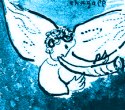
09.19.12 (Tishri 3, 5773) There is a profound difference between talking or thinking about spirituality and actually living a spiritual life, yet it is thoughtlessly easy to mistake the former for the latter... Who are you when you think no one is looking? The apostle Paul rhetorically asked, "Am I trying to please man? If I were still trying to please man, I would not be a servant of the Messiah" (Gal. 1:10). Test yourself. Does the thought of how you appear to others move you more than the thought of how you appear to God? Craving approval from others is as serious a problem as alcoholism or addiction to drugs... The struggle to be real, to turn and face ourselves, means acknowledging our disguises. It is just as easy to hide from God by "being good" as it as from "being bad."
Seeking the LORD...
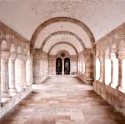
09.19.12 (Tishri 3, 5773) It is said that "God hides so that we will seek Him." An old story relates that there once was a king who built himself a glorious palace. By means of magical illusion it seemed as if the palace were filled with devious corridors and mazes, preventing approach to the royal presence. But as there was also much gold and silver heaped up in the entrance halls, most people were content to go no further but to take their fill of treasure. The king himself, they did not notice. At last the king's aide took compassion on them and said, "All these walls and mazes which you see before you do not in truth exist at all. They are mere illusions. Push forward bravely, and you find no obstacles. Therefore "seek the LORD while he may be found; call upon him while he is near."
דִּרְשׁוּ יְהוָה בְּהִמָּצְאוֹ
קְרָאֻהוּ בִּהְיוֹתוֹ קָרוֹב
dir·shu · Adonai · be·him·matz·o
ke·ra·u·hu · bi·yo·to · ka·rov

"Seek the LORD while he may be found;
call upon him while he is near" (Isa. 55:6)

Download Study Card
The sages affirm, "This world is like a corridor before the World to Come; prepare yourself in the corridor, that you may enter into the hall" (Avot 4:21), which implies that the great commandment is always dirshuni vichyu (דִּרְשׁוּנִי וִחְיוּ) - "Seek Me and live." And though God invites everyone to come to Him for salvation and eternal life, nevertheless does He test the heart to ensure that we really want Him. Therefore we see Yeshua teaching in parables, using figures of speech, and so on.
Rabbi Bunam began teaching with these words: "We thank You, who are blessed and who are the source of blessing, that You are manifest and hidden." He continued: "A fearless man must feel God as he feels the place on which he stands. And just as he cannot imagine himself without a place to stand on, so he must in all simplicity grow aware of God who is the Place of the world, and comprises it. But at the same time he must know that He is the hidden life which fills the world. (Buber: Ten Rungs)
The Ten Days of Awe
 |
[ The following is related to Yom Kippur and the "Season of Repentance"... ]
09.18.12 (Tishri 2, 5773) According to Jewish tradition, on Rosh Hashanah (i.e., Tishri 1) the destiny of the righteous, the tzaddikim, are written in the Book of Life (סֵפֶר הַחַיִּים), and the destiny of the wicked, the resha'im, are written in the Book of Death (סֶפֶר הַמָּוֵת). However, most people will not be inscribed in either book, but have ten days -- until Yom Kippur -- to repent before "sealing their fate." On Yom Kippur, then, everyone's name will be written in one of the books. The ten days between Rosh Hashanah and Yom Kippur are therefore called Aseret Yemei Teshuvah (עֲשֶׂרֶת יְמֵי תְּשׁוּבָה) - the "Ten Days of Repentance" - because personal repentance can affect the divine decree for good. Shabbat Shuvah, then, is the first Shabbat of the year, which sets the tone for the rest of our year.
As Messianic believers, we maintain that Judgment Day has come and justice was served through the sacrificial offering of Yeshua for our sins (2 Cor. 5:21). He is the perfect fulfillment of the Akedah of Isaac. Our names are written in the Lamb's Book of Life, or Sefer Ha-chayim (Rev. 13:8). We do not believe that we are made acceptable in God's sight by means of our own works of righteousness (Titus 3:5-6), though that does not excuse us from being without such works (as fruit of the Holy Spirit in our lives). The Scriptures clearly warn that on the Day of Judgment to come, anyone's name not found written in the Book of Life will be thrown into the lake of fire (Rev. 20:15). Moreover, all Christians will stand before the Throne of Judgment to give account for their lives (2 Cor. 5:10). "Every man's work shall be made manifest: for the day shall declare it, because it shall be revealed by fire; and the fire shall try every man's work of what sort it is" (1 Cor. 3:13). Life is an examination, a test, and every moment is irrepeatable. Every "careless" word we utter will be echoed on the Day of Judgment (Matt. 12:36-37). Our future day of judgment is being decided today.
Note: for more on this important subject, including the trust that we are forever "sealed for good" in the Lamb of God's Book of Life, see "Getting Ready for the Days of Awe."
 |
Parashat Vayeilech...
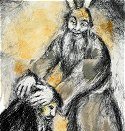
[ Our Torah reading for Shabbat Shuvah is parashat Vayeilech. It is prophetic that the first Torah reading of the year focuses on Joshua, a type of Messiah who will lead Israel into the promise. ]
09.18.12 (Tishri 2, 5773) In last week's Torah reading (i.e., parashat Nitzavim), Moses formally gathered the people of Israel together to ratify their covenant with the LORD. Moses then pled with the people bacharta ba'chayim - to "choose life" by pursuing the path of obedience to the Torah and its commandments. If the Israelites would do so, they would be blessed and prosper as God's chosen nation; but if not, they would be subjected to hard exile, persecution, and the threat of utter destruction.
In this week's portion (i.e., parashat Vayeilech), Moses announced his impending death and transferred the leadership of the Jewish nation to Joshua (יְהוֹשֻׁעַ), a type of Messiah who would bring Israel into the promised land. Moses continued his speech, and foresaw that despite his appeals the people would turn away from the covenant, which would cause God's face to turn away: "And hiding I will hide My face on that day, because of all the evil they have committed" (Deut. 31:18). The sages note this verse is grammatically unusual because of the double use of the word "hide" (i.e., הַסְתֵּר אַסְתִּיר פָּנַי). God hides the fact that He is in hiding... If you do not know that God is "hiding," you will not seek for Him; and if you feel within your heart that God is hiding, you are invited to return to Him, as King David said, "When you said, 'Seek my face;' my heart said to You, 'Your face, LORD, will I seek.'
לְךָ אָמַר לִבִּי בַּקְּשׁוּ פָנָי
אֶת־פָּנֶיךָ יְהוָה אֲבַקֵּשׁ
le·kha · a·mar · lib·bi · ba·ke·shu · fa·nai
et · pa·ne·kha · Adonai · a·vak·kesh

When you said, 'Seek my face;'
my heart said to You, 'Your face, LORD, will I seek.'
(Psalm 27:8)

In this connection we note that Yeshua often spoke in the form of a parable (παραβολή) to "code" his meaning, to make it accessible only to those who were genuinely willing to make comparisons, to reason analogically, and so on (Isa. 1:18; 1 Cor. 2:13). He used "indirection," allusion, allegory, and "figures of speech" (παροιμία, lit. "[speech] beyond the usual way"), in order to provoke people to explore and ask the hard questions about life... "Truly, you are a God who hides himself, O God of Israel, the Savior" (Isa. 45:15).
"For God so loved the world" that He disguised himself as a bondservant to die in shame upon a cross; "God so loved the world" that he became entirely unesteemed -- "despised and rejected of men, a man of sorrows, acquainted with grief" (Isa. 53:3). Yet even Moses foresaw the stupor of the people in relation to the truth of God (Deut. 29:4). Regarding the "hiding of face," in His sovereign judgment God decreed: "They know not, nor do they discern, for he has smeared their eyes so that they cannot see, and their hearts, so that they cannot understand" (Isa. 44:18). God "gave them over to their stubborn hearts, to follow their own devices" (Psalm 81:12; Rom. 1:24); they went "backward and not forward" (Jer. 7:24). This was not a blindness induced by the "god of this world" as much as it was a darkness induced by the flesh and its apathy toward God. The mind became dull and sleepy because it ceased to believe in the miracle - and to realize that God's truth is always something extraordinary, spectacular, and wonderful...
Note that you can download the Shabbat Table Talk for parashat Vayeilech here.
 |
Shabbat Shuvah - שַׁבַּת שׁוּבָה

[ Yom Kippur begins an hour before sundown on Tuesday, September 25th... ]
09.18.12 (Tishri 2, 5773) The Sabbath between Rosh Hashanah and the solemn fast of Yom Kippur is the very first of the new year, called Shabbat Shuvah (שַׁבַּת שׁוּבָה) - that is, "the Sabbath of Return." It is called "shuvah" because the Haftarah (i.e., Hosea 14:1) begins, Shuvah Yisrael ad Adonai Elohekha (שׁוּבָה יִשְׂרָאֵל עַד יְהוָה אֱלהֶיךָ): "Return, O Israel, unto the LORD your God!" As the first Shabbat of the new year, Shabbat Shuvah is intended to "set the tone" for the rest of the year:
שׁוּבָה יִשְׂרָאֵל עַד יְהוָה אֱלהֶיךָ
כִּי כָשַׁלְתָּ בַּעֲוֹנֶךָ
shu·vah · Yis·ra·el · ad · Adonai · E·lo·hey·kha,
ki · kha·shal·ta · ba·a·vo·ne·kha

"Return, O Israel, to the LORD your God,
for you have stumbled because of your iniquity."
(Hosea 14:1)

Download Study Card
A Yom Kippur Parable...

[ The following is related to Yom Kippur and the "Season of Repentance"... ]
09.18.12 (Tishri 2, 5773) A king appointed a tutor to take constant care of his son's conduct and to instruct him in the ways of royalty. The prince refused to heed the tutor's instruction, however, and indulged in many sins. The tutor, indignant at his pupil, informed the king, who thereby became estranged from his son. In contrition, the prince sought many times to regain his father's love, but the tutor would remind the king of his son's grave misconduct, and the king thence would not relent. Once, during the tutor's absence, however, the prince ran to the king, imploring his father's forgiveness and favor. The father's heart melted within him, and he embraced the son with tearful gladness...
In this parable, the tutor represents the "Law" and its just requirements (see Gal. 5:24-25), which indeed are holy, just, and good, but (because of our sinful condition) are used by the satan to accuse us and to oppose our reconciliation with our Father in heaven. Because of Yeshua, however, who fulfilled the law on our behalf and paid the full penalty for our transgressions, we are set free from the curse of the law and are given eternal atonement... The voice of judgment has been silenced and the satan has forever been confounded because God's love for us overcomes the power of sin and death. (For more on this subject, along these same lines, see the article, "The Problem with Torah").
Note: Of course we are now enabled to keep the inner intent of the Torah by the power of the Holy Spirit, the Ruach ha-kodesh, because of the finished work of Yeshua on the cross. Regarding this question it should be obvious to those of you who know this ministry: There is simply no true Torah observance apart from the Torah of Yeshua....
 |
Reading of the Heart...

[ The following is related to Yom Kippur and the "Season of Repentance"... ]
09.18.12 (Tishri 2, 5773) There is a midrash about a little farmer boy who, having been left an orphan at a early age, was unable to read, but who inherited a large heavy prayer book from his parents. On Yom Kippur (the Day of Atonement) he brought the book to the synagogue, laid it on the stand, and weeping said: "Lord of Creation! I do not know how to read; I do not know what to pray. But see! I give you the entire prayer book. He then bent his head over the book and quietly sobbed before the Divine Presence...
Happy New Year 5773!
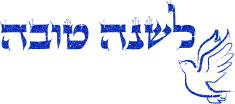
09.17.12 (Tishri 1, 5773) Happy New Year - Shanah Tovah - chaverim! Here are a few pictures taken during our Rosh Hashanah celebration last evening. As you can see in the pictures, the boys are getting bigger: Josiah is now seven and Judah is three! Thank you so much for praying for these precious little guys, and for our family, too....
Left-to-right (top): 1. Apples and honey; 2. Judah dips the honey; 3. the yom tov table;
4. Josiah helps set the table; 5. Olga and John
(middle): 1. Josiah and Peter; 2. eating pomegranate seeds; 3. Vadim "tunes" the shofar;
4. "lismo'ah kol shofar"; 4. Round challah (apricot chocolate chip!)
(bottom): 1. Judah blows the shofar; 2. Allen with shofar; 3. Peter and Judah;
4) Yasha blows the shofar; 5) Vadim and Irina
זֶה־הַיּוֹם עָשָׂה יְהוָה נָגִילָה וְנִשְׂמְחָה בוֹ
zeh · hai·yom · a·sah · Adonai, · na·gi·lah · ve·nis·me·chah · vo

"This is the day that the LORD has made; let us rejoice and be glad in it"
(Psalm 118:24)
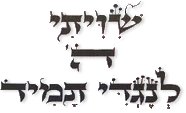
Listen to the Shofar:

Our family sincerely wishes you "shanah tovah u'metukah ba'adoneinu Yeshua ha-Mashiach" - a good and sweet year in our Lord Jesus the Messiah! May the LORD God heal you, body and soul; may He ease your pain, increase your strength, and release you from all your fears... May blessing, love, joy, and true shalom surround you and fill you with ongoing wonder and thanks. In the Name above all Names we pray: Amen.
King Messiah and Rosh Hashanah
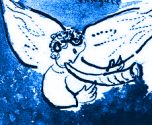
[ Shanah Tovah, chaverim... May blessing, love, joy, and peace surround you and fill you with wonder and thanks this day. In Yeshua's name: Amen. ]
09.16.12 (Elul 29, 5772) Both the Torah of Moses and the New Testament attest that Yeshua is Elohim (אֱלהִים) -- the Creator of the cosmos: בְּרֵאשִׁית הָיָה הַדָּבָר / "in the beginning was the Word" (John 1:1,14). The Divine Word and Voice cannot be separated from God any more than the Spirit of God can be separated. Yeshua is the Source of all life in the universe: כָּל־הַמַּעֲשִׂים נִהְיוּ עַל־יָדוֹ / "All things were made by Him (John 1:3). The "Word made flesh" is the "image of the invisible God" and the "radiance of the glory of God and the exact imprint (χαρακτήρ, 'character') of his nature" (Col. 1:15). All of creation is being constantly upheld by the word of His power (Heb. 1:3): "All things were created by Him (i.e., Yeshua), and for Him" and in Him all things consist (συνεστηκεν, lit. "stick together") (Col. 1:16-17). As our Creator and Master of the Universe, Yeshua is our King and our Judge, and therefore Rosh Hashanah centers on Him.
But in addition to God's power and sovereignty as our Creator, we note that the Scriptures begin and end with the redemptive love of God. Yeshua is the Center of Creation - it's beginning and end. As it is written: אָנכִי אָלֶף וְתָו רִאשׁוֹן וְאַחֲרוֹן ראשׁ וָסוֹף / "I am the 'A' and the 'Z,' the First and the Last, the Beginning and the End" (Rev. 22:13). Indeed, Yeshua is מֶלֶךְ מַלְכֵי הַמְּלָכִים / Melech Malchei Hamelachim: The "King of kings of kings." He is LORD of all possible worlds -- from the highest of celestial glories to the very dust of death upon a cross... יְהִי שֵׁם יהוה מְברָךְ / yehi shem Adonai mevorakh: "Let the Name of the LORD be blessed" forever and ever (Psalm 113:2).
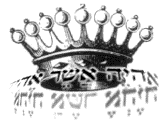 |
The central point of all true Torah, then, is the redemptive love of God demonstrated in the "first and last" principle of sacrificial life. This was prefigured in the original paradise when Adam and Eve were clothed by the lamb sacrificed for their transgression (Gen. 3:21), and the theme continues throughout the Torah, for example, in the account of the sacrifice of Isaac (we blow the shofar on Rosh Hashanah to recall this great act of faith), in the visions of Jacob, in the commissioning of Moses, in the redemption from death by the blood of the sacrificed lamb in Egypt, and by the climactic revelation of the altar given at Sinai (i.e., the Tabernacle). Just as the "korban tamid" of the Temple (i.e., the continual sacrifice of the lamb upon the altar) recalled the original Passover and foretold of the Lamb of God to come, so Yeshua, the "Living Torah," embodied the Sacrificial Life itself, the true Lamb of God that was offered upon the stigma of the cross, to demonstrate God's infinite condescension, mercy and love that redeems the world from sin and death. Just as there is no Passover apart from the Lamb, so there is no "Rosh Hashanah" or "Yom Kippur" apart from God's atoning love given in the Messiah...
Rosh Hashanah is traditionally observed as the time of the creation of man by God on the sixth day. When Adam first opened his eyes and human consciousness was born, he immediately understood that the LORD created all things, including himself. According to midrash, Adam's first words were, יהוה מֶלֶךְ עוֹלָם וָעֶד / Adonai malakh olam va'ed: "The LORD is King for ever and ever." And so it is with those whose blind eyes are opened by Yeshua; we see that He is the true King of Kings, the LORD of Lords, the true Judge and Righteous Savior of the world... May all Israel say: בָּרוּךְ הַבָּא בְּשֵׁם יְהוָה, "Blessed is He who comes in the Name of the LORD."
Note: For more on this, see "High Holidays and the Gospel."
 |
The Testing of Heart...

09.16.12 (Elul 29, 5772) In traditional Jewish thinking, Rosh Hashanah commemorates the creation of Adam and Eve, and therefore it may be regarded as their "birthday" of sorts. However, on the very day that Adam and Eve were created, they disobeyed God and were sent into exile from the paradise of the orchard, and therefore Rosh Hashanah commemorates humanity's rebellion against God as well.
Life is a serious business, friends, and it is also a test. It is "God who tests our hearts" (1 Thess. 2:4). Yeshua said, "I am he who searches hearts and minds, and I will repay each of you according to your deeds" (Rev. 2:23). We have one opportunity to live for Yeshua in this life, and the fact that we will each face a day of judgment before the LORD should sober us to sanctity. God holds us responsible for what we think and believe (Acts 17:30-31), and this implies that we have a moral and spiritual duty to think clearly and not abuse our minds (Phil. 4:8; Rom. 12:2).
Note: For more on this see, "Your Own Day of Judgment."
 |
Christians and Rosh Hashanah...

[ Shanah Tovah, chaverim... May you experience the sweetness and the goodness of the LORD in your hearts today - and forever. Amen. ]
09.16.12 (Elul 29, 5772) Abraham was a true prophet of the LORD who kept the inner meaning of the Torah centuries before the giving of the Sinai revelation (see Gen. 26:5). He was obviously not born Jewish, yet God loved him and chose him as his own. Martin Buber asks, "Why do we say, 'Our G-d and the G-d of our fathers"? And answers that there are two kinds of people who have faith on G-d. One believes because he has taken over the faith of his fathers, whereas the other comes to faith by direct revelation from God." Likewise Torah says "The God of Abraham, the God of Isaac, and the God of Jacob," rather than the "God of Abraham, Isaac, and Jacob," precisely to say that each of these were given direct revelation of God themselves... Therefore the Talmud (Sanhedrin 59a) states: "A gentile who studies Torah is akin to a High Priest." More here.
 |
Rosh Hashanah and New Creation

09.16.12 (Elul 29, 5772) Just as God produced a bride from the wound he made in the sleeping Adam (Gen. 2:22), so a spiritual bride was produced when Yeshua suffered the "sleep of death" for everyone upon the cross, as evidenced by his pierced side after his death (John 19:34). Just as Adam's dream was fulfilled in Eve, so Yeshua's is fulfilled in the "bride of Messiah," his called-out assembly that follow him (Eph. 5:27). This is part of the "deeper message" of Rosh Hashahah.
Note: For more on this see "Briah Chadashah: Rosh Hashanah and New Creation."
Shanah Tovah v'Shabbat Shalom!
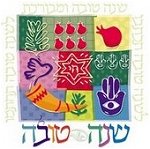
09.14.12 (Elul 27, 5772) From our Torah this week is found the promise: "God will circumcise your heart" (Deut. 30:6). Circumcision involves the removal of the "outer" to reveal the inner (and more sensitive) part. The metaphor suggests "heart surgery" where the heart would be "opened up" to love God without blockage or obstruction. This is connected with the New Covenant (Jer. 31:30-32) when the Torah would be "written upon the heart" and become part of the inner life of the soul. The purpose of this is "so that you may live," i.e., experience rebirth and new life.
A changed heart leads to surrender to God's love which is filled with great peace. As Hudson Taylor once wrote: "I am no longer anxious about anything, as I realize that He is able to carry out His will for me. It does not matter where He places me, or how. That is for Him to consider, not me, for in the easiest positions He will give me grace, and in the most difficult ones His grace is sufficient." May God help us surrender to His Presence...
May you have a good and sweet year... May God heal you, body and soul; may He ease your pain, increase your strength, and release you from all your fears... May blessing, love, joy, and peace surround you and fill you with wonder and thanks. In Yeshua's name: Amen.
Note: Recently some people have sought to convince me that the holiday of Rosh Hashanah is "pagan" or "rabbinical," and that the Torah only calls this time Yom Teruah, a day of noisemaking... My response remains the same: Yes, it is indeed called Yom Teruah, but it is also Rosh Hashanah, the seventh new moon of the year, representing the completion of the harvest cycle, which therefore mirrors the first half of the Jewish calendar year... Celebrating Rosh Hashanah is a way to recall the coming Day of Judgment and to intercede on behalf of the Jewish people all over the world..
 |
L'Shanah Tovah in Messiah

09.14.12 (Elul 27, 5772) It is customary to wish one another a "good and sweet year" during Rosh Hashanah. The traditional Jewish blessing is not appropriate, however, since followers of Yeshua believe that their names are indeed written (and sealed) in the Lamb's Book of Life forever and for good. Therefore the following may be recited instead:
יְהִי רָצוֹן מִלְּפָנֶיךָ יהוה אֱלהֵינוּ
וֵאלהֵי אֲבוֹתֵינוּ
שֶׁתְּחַדֵּשׁ עָלֵינוּ שָׁנָה טוֹבָה וּמְתוּקָה
בַּאֲדנֵינוּ יֵשׁוּעַ הַמָּשִׁיחַ אמן
ye·hi ra·tzon mil·fa·ne·kha, Adonai E·lo·hei·nu
ve·lo·hei a·vo·tei·nu,
she·te·cha·desh a·lei·nu sha·nah to·vah u·me·tu·kah
ba·A·do·nei·nu Ye·shu·a ha·Ma·shi·ach [a·men]

"May it be your will, LORD our God
and God of our fathers,
that you renew for us a good and sweet year
in our Lord Yeshua the Messiah." [Amen]
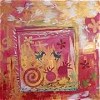
Download Study Card
Shabbat Shalom and L'Shanah Tovah to you in Yeshua our Messiah - Melech Malchei Ha-Melachim (מֶלֶךְ מַלְכֵי הַמְּלָכִים) - the King of king of kings! All glory belongs to our Savior, our King, our Judge, and gracious and wonderful LORD. His is the Name above all Names. Ascribe to Him your praise! And may we all merit to soon hear the sound of his heavenly shofar as he calls us home to be with him forever!
 Listen to the Shofar (click speaker icon) Listen to the Shofar (click speaker icon)
Thanking God for the Season
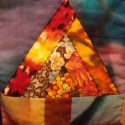
09.14.12 (Elul 27, 5772) Just as the spring festivals (Passover, Firstfruits, and Shavuot) have been perfectly fulfilled in the first coming of Yeshua as Mashiach ben Yosef, so the fall festivals (Rosh Hashanah, Yom Kippur, and Sukkot) will be fulfilled in His second coming as Mashiach ben David. Since the first advent fulfilled all of the spring holidays to the smallest of details, we believe that His second advent portends similar fulfillment as revealed in the fall holidays. Let us thank God for His great plan of salvation revealed in the festivals:
בָּרוּךְ אַתָּה יהוה אֱלהֵנוּ מֶלֶךְ הָעוֹלָם
אֲשֶׁר נָתַן לָנוּ חַגִּים, חֻקּוֹת, וּמוֹעֲדִים לְשִׂמְחָה
לִכְבוֹד יֵשׁוּעַ הַמָּשִׁיחַ אֲדוֹנֵינוּ, אוֹר הָעוֹלָם
ba·rukh · at·tah · Adonai · E·lo·he·nu · me·lekh · ha·o·lam,
a·sher · na·tan · la·nu · chag·gim, · chuk·kot, · u·mo·a·dim · le·sim·chah,
likh·vod · Ye·shu·a · ha·ma·shi·ach · A·do·nei·nu · ohr · ha·o·lam

"Blessed art You, LORD our God, King of the universe,
who has given to us holidays, customs, and seasons of happiness,
for the glory of our Lord Yeshua the Messiah, the light of the world."
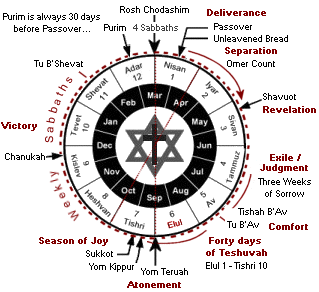
(Download Study Card)
Note the symmetry of the Torah calendar. The fall festivals "mirror" the spring festivals, and therefore they correspond to one another. Just as there is a "new year" in the spring (aviv), on the new moon of Nisan, so there is in the fall, on the new moon of the seventh month... That is why we make a teruah shout in thanks to God - both for the harvest that was given and in anticipation of the fulfillment of God's redemptive purposes during the End of Days.
Choose Life Today...
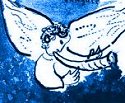
[ Our Torah portion this week, parashat Nitzavim, is always read on the Sabbath before Rosh Hashanah, since it describes the process of turning (teshuvah)... ]
09.14.12 (Elul 27, 5772) Where it says, "See, I have set before you today (הַיּוֹם) life and good, death and evil" (Deut. 30:15), we note that on any given day a person can choose the way of life or the way of death. If until now he was on the corrupt path, today he can choose the good; and if until now he was on the good path, he must choose it again today lest he choose the evil. In other words, every day, indeed every moment of the day, presents us with the spiritual choice: Choose life and good, or death and evil. As it says in the New Testament: "Today, if you hear his voice, do not harden your hearts" and again, "Exhort one another every day, as long as it is called 'today,' that none of you may be hardened by the deceitfulness of sin" (Heb. 3:7-8,13).
Nitzavim and Rosh Hashanah
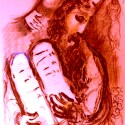
[ Our Torah portion this week, parashat Nitzavim, is always read on the Sabbath before Rosh Hashanah, since it describes the process of turning (teshuvah)... ]
09.14.12 (Elul 27, 5772) Parashat Nitzavim is always read on the Sabbath before Rosh Hashanah, serving as a prelude to the holiday. The sages found an allusion to Rosh Hashanah in the opening verse: "You are standing today all of you before the LORD your God" (Deut. 29:10), where "this day" refers to Rosh Hashanah, when "all of you" shall stand before the LORD your God. Another tradition says "this day" refers to the day of Moses' death, the same day that Joshua would become the leader of the people. Since Joshua is a picture of Yeshua, in the latter sense we see an allusion to the rapture of God's people who will stand before the LORD at the sound of the shofar blast (1 Thess. 4:16-17; 1 Cor. 15:51-52). This is one of the "secret things" (הַנִּסְתָּרת) that belong to the LORD (Deut. 29:29), though the mystery was revealed to Paul. The "last" shofar blast refers to Rosh Hashanah when the dead shall be raised (Rosh Hashanah 16b), whereas the "great" shofar blast is sounded at the end of Yom Kippur, after Israel has received the atonement.
In this connection, the Kol Dodi notes that the final redemption of the Jewish people will occur only when the people acknowledge that both the blessing and the curse come from the hand of God (see Deut. 30:1-2). As long as Israel credits some other power - for example, their own ingenuity or even their failures - with control over their fate, they will not return to God. This is hinted at in Deut. 30:1, "And it shall be, when all these things come upon you, the blessing and the curse..." The letters of "and it will be" (וְהָיָה) spell the Sacred Name (יהוה), and therefore a complete return to the LORD implies accepting that both the blessing and the curse come from God's soverign purposes for our ultimate good.
According to many of the sages, the time immediately preceding the appearance of the Messiah will be a time of testing (nisayon) in which the world will undergo various forms of tribulation called chevlei Mashiach (חֶבְלֵי הַמָּשִׁיחַ) - the "birth pangs of the Messiah" (Sanhedrin 98a; Ketubot, Bereshit Rabbah 42:4, Matt. 24:8). Some say the birth pangs are to last for 70 years, with the last 7 years being the most intense period of tribulation -- called the "Time of Jacob's Trouble" / עֵת־צָרָה הִיא לְיַעֲקב (Jer. 30:7). The climax of the Great Tribulation is called the great "Day of the LORD" (יוֹם־יהוה הַגָּדוֹל) which represents God's wrath poured out upon a rebellious world system. On this fateful day, the LORD will terribly shake the entire earth (Isa. 2:19) and worldwide catastrophes will occur. "For the great day of their wrath has come, and who can stand?" (Rev. 6:17). The prophet Malachi likewise says: "Surely the day is coming; it will burn like a furnace. All the arrogant and every evildoer will be stubble, and that day that is coming will set them on fire,' says the LORD Almighty. 'Not a root or a branch will be left to them'" (Mal. 4:1). Only after the nations of the world have been judged will the kingdom of God (מַלְכוּת הָאֱלהִים) be established upon the earth. The remnant of Israel will be saved and the 1000 year reign of King Messiah will then commence (Rev. 20:4). For more information about this, see "As the Day Draws Near."
 |
Rosh Hashanah and Mercy
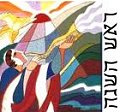
09.14.12 (Elul 27, 5772) Rosh Hashanah is called Yom Ha-Din (יוֹם הַדִּין), the Day of Judgment, whereas Yom Kippur is called Yom Ha-Rachamim (יוֹם הָרַחֲמִים), or the Day of Mercies, which suggests that God is first revealed as our Creator and Judge before He is known as our merciful Savior. This is hinted in the two accounts of creation, where God is first revealed as Elohim (Gen. 1:1), but later is revealed as YHVH (יהוה) when He breathed life into man nishmat chayim, the breath of life (Gen. 2:4). It is somewhat odd, however, that during Rosh Hashanah we do not approach God as our Judge, beating our breast in sorrow during confession of sin, as we do on Yom Kippur. Some say the reason we celebrate, eating special foods, rejoicing, listening to the shofar, is because we rejoice in the kingship of God as His royal children, and only later do we appeal to Him as merciful Judge in light of His revelation as YHVH, our Savior, Redeemer, and Lord. As believers in Yeshua, we have all the more reason to rejoice on Rosh Hashanah, since at the cross Yeshua took upon Himself our judgment to give us everlasting mercy from God.
 |
Lift up your heads...

09.13.12 (Elul 26, 5772) Rosh Hashanah literally means the "head of the year," and it traditionally marks the anniversary of the creation of mankind. The sages note that where it is written, "When you take a census of the children of Israel" (Exod. 30:12), the Hebrew reads, "When you lift up the heads (כִּי תִשָּׂא אֶת־ראשׁ) of the children of Israel," which implies that each person should be encouraged to understand that they "count" in the eyes of Heaven. Rabbi Blech notes that the word "Israel" (יִשְׂרָאֵל) contains the letters that form the phrase li rosh (לִי ראשׁ), "there is to me a head," that is, a soul created in the image of God.
During Rosh Hashanah we affirm our faith that the LORD our God is the great King over all the earth (מֶלֶךְ גָּדוֹל עַל־כָּל־הָאָרֶץ). The Hebrew word "king" is melekh (מֶלֶךְ), the value of which is 90, the same as the Hebrew letter Tzadi (צ), meaning "Righteous One." Indeed some of the sages say that the word "amen" (אמן) is an acronym for the phrase El Melekh Ne'eman (אֵל מֶלְךְ נֶאֱמָן) - "God is a Righteous King." The LORD is a God of faithfulness and without iniquity, just and upright is he (Deut. 32:4). The LORD God, the Righteous One has "ascended with a shout, the LORD with the sound of a shofar" (Psalm 47:5). This refers to the ascension and glorification of our Savior Yeshua, who ascended in triumph over sin and death our behalf. Sing praises unto our King!
 |
Love First and Last...
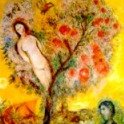
09.13.12 (Elul 26, 5772) The Talmud (Sotah 14a) states that the Torah begins and ends with acts of loving kindness (i.e., gemilut chassidim). It begins with the LORD clothing Adam and Eve with the skin of the sacrificed lamb in the garden (Gen. 3:21), and it ends with God burying Moses in the valley (Deut. 34:6). The core of the Torah, then, is to act in chesed, or lovingkindness. This is alluded to in the text of the Torah itself, which begins with a letter Bet (בּ) and ends with a letter Lamed (ל). These two letters, when read "from the back to the beginning" spell the word lev (לב), or "heart." The matter of last and first importance, then, and our core responsibility, is to learn to behold the heart of God for us and to walk in truth of His love. As it says in the New Testament, "walk in love, as the Messiah loved us and gave himself up for us, a fragrant offering and sacrifice to God" (Eph. 5:2).
Teshuvah of Faith...
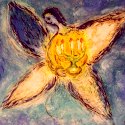
09.13.12 (Elul 26, 5772) Teshuvah is an ongoing journey toward wholeness, and in this life we never fully arrive: we are always "on the road," and often we are in the dark... The way of teshuvah is therefore more of a question about how we walk the road than what the road is like or even where it may take us. As we turn to God, as we experience His claim on our lives and trust that we are His redeemed people, questions about "how" are revealed, one step at a time. We take up the cross daily, and in doing so we find ourselves on the road, even if we may not know where it is immediately taking us.
מִי בָכֶם יְרֵא יְהוָה שׁמֵעַ בְּקוֹל עַבְדּוֹ
אֲשֶׁר הָלַךְ חֲשֵׁכִים וְאֵין נגַהּ לוֹ
יִבְטַח בְּשֵׁם יְהוָה וְיִשָּׁעֵן בֵּאלהָיו
mi · va·khem · ye·rei · Adonai · sho·mei·a · be·kol · av·do?
a·sher · ha·lakh · cha·she·khim · ve·ein · no·gah · lo?
yiv·tach · be·Shem · Adonai · ve·yi·sha·en · be·lo·hav

"Who among you fears the LORD and obeys the voice of his servant?
Let him who walks in darkness and has no light
trust in the Name of the LORD and rely on his God."
(Isa. 50:10)

It is dangerous to assume that a person who is walking in spiritual darkness must necessarily be outside of God's will, or that such a person is being punished by God. That, after all, was the karma-based theology delivered to Job by his religious friends... On the contrary, as Charles Spurgeon reminds us, "Spiritual darkness of any sort is to be avoided and not desired; and yet, surprising as it may seem to be, it is a fact that some of the best of God's people frequently walk in darkness; some of them are wrapped in a sevenfold gloom at times, and to them neither sun, nor moon, nor star appears. As the pastor of a large church, I have to observe a great variety of experiences, and I note that some of whom I greatly love and esteem, who are, in my judgment, among the very choicest of God's people, nevertheless, travel most of the way to heaven by night."
Indeed, Yeshua himself entered into darkness for our sake, and he sometimes has his followers go there, too. "Through struggle with his demons and the encounter with the LORD, Anthony had learned to diagnose the hearts of people and the mood of his time and thus to offer insight, comfort, and consolation. Such had made him a compassionate man." (Wisdom of the Desert Fathers)
There is a "center" or focus of life, however, and that is the cry of the heart for the LORD Himself. Therefore the LORD is called El Ne'eman (אֵל נֶאֱמָן), "the faithful God." His very Name means certainty, reliability, strength, truth, reality, presence, being, life, and so on... It follows from this that doubt is never from God, since the one who doubts is "driven like a wave of the sea and tossed" by the winds of change. We are given strength from heaven when we exercise bittachon (trust) that God is faithful and true, despite passing through the valley of the shadow of death itself. God abides with us during our sojourning. The LORD is the only enduring Reality in a constantly changing world, this world of flux and shadows, and He has designed it this way to cause men's hearts to search for him. "All flesh is grass, and all its beauty is like the flower of the field" - such is the condition of this ephemeral world and its fortunes. The flesh fades because the breath of the LORD blows (רוּחַ יְהוָה נָשְׁבָה) upon it (Isa. 40:7). God Himself has ordained human life to be a vapor:
יָבֵשׁ חָצִיר נָבֵל צִיץ
וּדְבַר־אֱלהֵינוּ יָקוּם לְעוֹלָם
ya·vesh · cha·tzir · na·vel · tzitz
u·de·var · E·lo·hei·nu · ya·kum · le·o·lam

"The grass withers, the flower fades,
but the word of our God will stand forever."
(Isa. 40:8)

Hebrew Study Card
Nonetheless, despite the inescapable dissolution of the flesh in this world, we are told not to fear, because there is good news for Zion: the LORD is coming with might to reward those who are waiting for him. He will tend his flock like a shepherd; he will gather his lambs and carry them close to his heart (Isa. 40:11). As the apostle Peter said, this good news is the eternal life given through the imperishable "seed" - the Word of God that rises forever in Yeshua (1 Pet. 1:23-25).
Teshuvah of Listening...
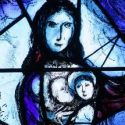
09.13.12 (Elul 26, 5772) Shema O Israel - Listen! Quiet your heart... find a moment to relax and deeply breathe. The Name of the LORD (יהוה) literally means Presence... God is, was, and always shall be Present. Now listen again, using the inner ear, the "ear of the heart." Listen for the inner Voice of Love calling out for you to turn to LORD your God. Listen with all your heart, all your soul, all your strength -- and you will hear the Voice of the LORD calling out to you from the midst of the storm. Yeshua is the Word, the Voice, of God's love.
Turning as a Child...
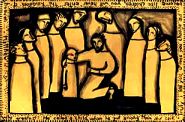
09.13.12 (Elul 26, 5772) There is no teshuvah apart from humility (Matt. 5:5). The disciples of Yeshua came asking, "Who is the greatest in the kingdom of heaven?" And calling to him a child, he put him in the midst of them and said, "Truly, I say to you, unless you turn (shuv) and become like children (להְיוֹת כַּיְלָדִים), you will never enter the kingdom of heaven" (Matt. 18:2-3). Said the Kotzer Rebbe, "It is proper to weep during the High Holy Days in order to show that despite all our seeming wisdom and learning, we are as helpless as little children who weep for what they desire." "I thank you, Father, Lord of heaven and earth, that you have hidden these things from the wise and understanding and revealed them to little children; yes, Father, for such was your gracious will" (Matt 11:25-26).
The late Henri Nouwen wrote, "I am beginning to see that much of praying is grieving." Contrition, grief, and regret for our sins is at the heart of genuine teshuvah. Crying is a expression of utter humility, helplessness, and need. In this life we weep over many things, but we inwardly cry for our Abba, our heavenly Father's love...
 |
Repentance and Reciprocity...
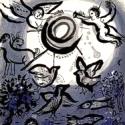
[ The following is related to the month of Elul and the "Season of Repentance"... ]
09.13.12 (Elul 26, 5772) "Do not let your left hand know what your right hand is doing..." It is said that God remembers all forgotten things, and that if you do an act of kindness and forget it, God remembers it for your good; but if you cling to its memory, the Lord forgets it. Similarly, when you transgress and remember it - confessing and forsaking the sin (even if 70 x 7 times, if necessary), the Lord "forgets" it, casts it to the "depths of the sea," and so on; but if you pay no heed and forget your sin, the Lord puts it to remembrance...
The Venture of Teshuvah....

[ Rabbi Simcha Bunam of Peshischa once told the following parable regarding the need for self-examination and teshuvah. ]
09.13.12 (Elul 26, 5772) A father loaned his son ten thousand dollars to establish him in business. When the time for repayment came, he perceived his son had used the money wisely, and therefore made him a gift of the money loaned. On another occasion he lent the same amount to a second son. When the time for repayment came, he found that the youth had used his investment unwisely, and to prevent further losses, withdrew his money, forcing the son to abandon the business. And so it is with us. God loans us the impulse to examine our hearts and repent of unworthy deeds. If we use this impulse wisely, he allows us to continue in the venture; but if we do nothing and make no use of this impulse, he takes it back and we remain unrepentant and sinful....
There were some present at that time who told him about the Galileans whose blood Pilate had mingled with their sacrifices. And Yeshua answered them, "Do you think that these Galileans were worse sinners than all the other Galileans, because they suffered in this way? No, I tell you; but unless you repent, you will all likewise perish. Or those eighteen on whom the tower in Siloam fell and killed them: do you think that they were worse offenders than all the others who lived in Jerusalem? No, I tell you; but unless you repent, you will all likewise perish.
And he [Yeshua] told this parable: "A man had a fig tree planted in his vineyard, and he came seeking fruit on it and found none. And he said to the vinedresser, 'Look, for three years now I have come seeking fruit on this fig tree, and I find none. Cut it down. Why should it use up the ground?' And he answered him, 'Sir, let it alone this year also, until I dig around it and put on manure. Then if it should bear fruit next year, well and good; but if not, you can cut it down.'" (Luke 13:1-9)
 |
Bitterness for Shalom
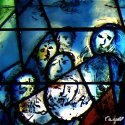
09.13.12 (Elul 26, 5772) Where it is written, "Behold, it was for my healing that I had bitterness - bitterness for me; but in love You delivered my life from the pit of destruction, for you cast all my sins behind your back" (Isa. 38:17), we note that the term "pit of destruction" (מִשַּׁחַת בְּלִי) might better be understood as the "pit of wearing out," that is, the pit of nothingness, consumption, vanity, or worthlessness (i.e., belial: בְּלִיַּעַל). The idea is that the LORD loves us "from the pit of nothingness." The word "loved" used here (i.e., chashak: חָשַׁק) means to be attached in devotion or affection, to embrace in kindness... God's great love is like that – it descends into the pit of shame and draws us out from it, just as Yeshua went down to the pit for that purpose – to deliver those trapped in throes of death (Psalm 88:4-6; Zech. 9:11, 12; Heb. 13:20, 2 Cor. 5:12, etc.).
הִנֵּה לְשָׁלוֹם מַר־לִי מָר
וְאַתָּה חָשַׁקְתָּ נַפְשִׁי מִשַּׁחַת בְּלִי
כִּי הִשְׁלַכְתָּ אַחֲרֵי גֵוְךָ כָּל־חֲטָאָי
hi·nei · le·sha·lom · mar · li · mar
ve·at·tah · cha·shak·ta · naf·shi · mi·sha·chat · be·li
ki · hish·lakh·ta · a·cha·rei · gev·kha · kol · cha·ta·ai

"Behold, it was for my healing that I had great bitterness;
but You in love have delivered my life from the pit of destruction,
for you have cast all my sins behind your back."
(Isa. 38:17)

Teshuvah and Acceptance...
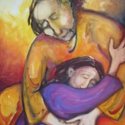
[ The following is related to the month of Elul and the "Season of Repentance"... ]
09.13.12 (Elul 26, 5772) During the season of teshuvah we recite Psalm 27 every day: "Look to the LORD and be strong; look to the LORD and have hope" (Psalm 27:14). We can look to the LORD in hope only to the extent we have learned to forgive and "endure ourselves." Faith believes that God's love is more real, more significant, and more powerful than even the worst of our sins, and therefore faith affirms God's prerogative in loving us for who we really are. The inner voice of faith affirms that the LORD "does not deal with us according to our sins (חַטּאות), nor repay us according to our iniquities (עֲוֹנת). For as high as the heavens are above the earth, so great is his steadfast love (i.e., chesed: חֶסֶד) toward those who fear Him; as far as the east is from the west, so far does he remove our transgressions (פְּשָׁעִים) from us" (Psalm 103:10-12).
כִּרְחק מִזְרָח מִמַּעֲרָב
הִרְחִיק מִמֶּנּוּ אֶת־פְּשָׁעֵינוּ
kir·chok · miz·rach · mi·ma·a·rav
hir·chik · mi·me·nu · pe·sha·ei·nu

"As far as the east is from the west,
so far does he remove our transgressions from us"
(Psalm 103:12)

When we draw near to the LORD in bittachon (trust), he causes our our transgressions to be banished from His presence (the hiphil form of the verb rachak [רָחַק], "to depart" is used in this verse, indicating that God's kindness is the cause of the action). This is because sin represents our separation from the heart of God, yet the Father's heart is always our home: "As a father shows compassion to his children, so the LORD shows compassion to those who fear him" (Psalm 103:13). In the parable of the prodigal son (Luke 15:11-32), there are two sons: the younger son who runs away and follows the path of unbridled lust, and the older son, who stays home yet inwardly turns away from his father's love. Both sons are lost, and the father grieves for both, because neither son truly understands the father's heart... May you know who you are in the Father's heart this day.
Our Daily Teshuvah...

[ The following is related to the month of Elul and the "Season of Repentance"... ]
09.12.12 (Elul 25, 5772) Teshuvah ("repentance") is described as "turning" to God, though practically speaking it is a repeated turning, that is, a turning to God in the moment of ambiguity, pain, distress... It is in the midst of the ego's clamor, before the parade of worldly desire or pressure, in the crucible of "everydayness" that we must "come to ourselves" and find true wonder. In that sense, teshuvah is a sort of focus, a direction, a seeking, and a center of life, the place of constant repair for the inner breach we constantly feel.
There is a "secret door" that you can enter at any time... This door leads to the realm of the Divine Presence, as King David said: shiviti (שִׁוִּיתִי) - "I have set the LORD always before me - because He is at my right hand, I shall not be shaken."
שִׁוִּיתִי יְהוָה לְנֶגְדִּי תָמִיד
כִּי מִימִינִי בַּל־אֶמּוֹט
shi·vi·ti Adonai le·neg·di ta·mid
ki mi·mi·ni bal e·mot

"I have set the LORD always before me;
because he is at my right hand, I shall not be shaken."
(Psalm 16:8)
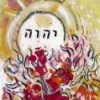
Hebrew Study Card
The Hebrew word shiviti comes from the verb shavah (שָׁוָה) which means "to set" or place, referring to focus of the heart required to truly apprehend the Divine Presence. In this connection, we note the "korban tamid" (תָּמִידקָרְבַּן) was the sacrifice of a lamb every evening and morning upon the copper altar in the outer court -- the central sacrifice of the Tabernacle. Along with it, matzah and wine offering were required, thereby revealing the true Passover Lamb of God and his sacrifice for us (Exod. 29:38-42). That the lamb was offered twice daily hints at its two applications - the first concerning the great deliverance from Egypt by the blood of the lamb, and the second concerning the even greater deliverance given through Yeshua, the true Lamb of God. Note also that the constant sacrifice of the lamb required that the fire at the altar would never be extinguished, and by extension, the duty to "care for the inner fire" (Nouwen). Thank God that the fire that daily needs tending comes from the Spirit of God within us!
 |
Anxiety and Healing...

09.12.12 (Elul 25, 5772) As a reminder we note that where it is written, "cast all your anxiety on him because he cares for you" (1 Pet. 5:7), the word translated "anxiety" (μέριμνα) comes from a Greek verb (μερίζω) that means to be fragmented or divided into parts and pieces. We bring our brokenness to God - including even those distractions that tear us away from Him and that tend to make us inwardly fragmented - in order to receive God's healing care for us. Today choose to regard your brokenness as an invitation to come before God for healing; never let it be a source of shame that keeps you from coming to the LORD for help! We are not to be ignorant of Satan and his devices... Despite our many sins, frailties, and even our own inner ambivalence, we know that God alone is our healer, our deliverer, and the true lover of our souls. The Spirit always cries out for you to come to the waters of life...
Spelling out "Teshuvah"

09.11.12 (Elul 24, 5772) Rabbi Sussya of Anipol said: "There are five verses in the bible that constitute the essence of Torah. These verses begin in Hebrew with one of these letters: Tav (תּ), Shin (שׁ), Vav (ו), Bet (בּ), and Hey (ה), which form the word for repentance, "teshuvah" (תְּשׁובָה). The five verses are 1) Tamim tiheyeh (תָּמִים תִּהְיֶה): "Be wholehearted before God" (Deut. 18:13); 2) Shiviti Adonai (שִׁוִּיתִי יְהוָה): "I have set the LORD always before me" (Psalm 16:8); 3) Va'ahavta lere'akha (וְאָהַבְתָּ לְרֵעֲךָ): "Love your neighbor as yourself" (Lev. 19:18); 4) Bekhol derakekha (בְּכָל־דְּרָכֶיךָ): "In all your ways know Him" (Prov. 3:6); and 5) Higid lekha (הִגִּיד לְךָ): "Walk humbly with your God" (Micah 6:8). In other words, the way of teshuvah, of answering God's call for you to return to Him, is to sincerely set the LORD before you, to love others, and to walk out your days in heartfelt gratitude.
הִגִּיד לְךָ אָדָם מַה־טּוֹב
וּמָה־יְהוָה דּוֹרֵשׁ מִמְּךָ
כִּי אִם־עֲשׂוֹת מִשְׁפָּט וְאַהֲבַת חֶסֶד
וְהַצְנֵעַ לֶכֶת עִם־אֱלהֶיךָ
hig·gid · le·kha · a·dam · mah · tov
u'mah · Adonai · do·resh · mi·me·kha
ki · im · a·sot · mish·pat · ve·a·ha·vat · che·sed
ve·hatz·ne·a · le·chet · im · e·lo·hey·kha

"He has told you, O man, what is good, and what the LORD requires of you:
Only to do justice, and to love kindness, and to walk modestly with your God"
(Micah 6:8)

Matters of Life and Death...

[ Our Torah portion this week, parashat Nitzavim, is always read on the last Shabbat of the year, since it describes the process of turning (teshuvah)... ]
09.11.12 (Elul 24, 5772) In our Torah portion this week we note that we are constrained by God to choose either "the blessing or the curse," and that we are not free not to choose, since the LORD God created us to make that very choice... In other words, teshuvah is not optional: we cannot choose not to choose; we cannot "opt out" of our responsibility before God. Every human being faces the holy dilemma, and there is no way to avoid the "either/or" by attempting to somehow unite heaven and hell. Spiritually, we must learn to "choose to choose," since denying the power of our choice (e.g., by rationalizing, blaming others, playing the victim) means repudiating our identity as a soul made in the image of God, and this results in being inwardly "disfigured" and fragmented... Since our life is the expression of our choices, the goal of life is to unify the heart's affections, to consolidate the power of the will, and to freely yield to the truth of God. The so-called "freedom" the world offers is really the freedom from responsibility, that is, the evasion of conviction and abandonment of the truth. Real freedom is the power to choose righteousness rather than to slavishly follow the lusts and fears of the lower nature. This is a miraculous freedom given by Yeshua, who alone gives us authority over the yetzer hara and all the power of the devil (John 8:36; Luke 10:19; Heb. 2:14; 1 John 3:8).
הַעִידתִי בָכֶם הַיּוֹם אֶת־הַשָּׁמַיִם וְאֶת־הָאָרֶץ
הַחַיִּים וְהַמָּוֶת נָתַתִּי לְפָנֶיךָ
הַבְּרָכָה וְהַקְּלָלָה
וּבָחַרְתָּ בַּחַיִּים לְמַעַן תִּחְיֶה אַתָּה וְזַרְעֶךָ
ha·i·do·ti ba·khem ha·yom et ha-sha·ma·yim v'et ha·a·retz
ha·cha·yim ve·ha·ma·vet na·tat·ti le·fa·ne·kha
ha·be·ra·khah ve·ha·ke·la·lah
u·va·char·ta ba·cha·yim le·ma·an ti·che·yeh at·tah ve·zar·e·kha

"I call heaven and earth to witness against you today, that
I have set before you life and death, blessing and curse.
Therefore choose life, that you and your offspring may live"
(Deut. 30:19)

The choice is yours - and yours alone - to make. "See, I am setting before you today a blessing and a curse..." Note that the expression "before you" (לִפְנֵיכֶם) implies that we have real choice and free will (bechirah chofshit). Belief in free will coheres with the revelation of God's righteousness, since punishment is fitting only when a person has a genuine choice between doing right and wrong. As Abraham said, "Shall not the Judge of all the earth do what is just?" (Gen. 18:25). Likewise the idea of reward is meaningless if God simply decreed who was to be saintly and who was not. Indeed, the validity of moral choice is implied in the imperatives found in Scripture – "ought implies can." As Yeshua said, "Repent (i.e., shuv: turn to God) - and believe the good news" (Mark 1:15; Rev. 2:5).
Free will is paradoxical in light of God's sovereignty, of course, though the paradox itself is no reason to negate its truth. Most people want to chose either horn of this dilemma (e.g., consider the Calvinism/Arminianism theological controversy), but the truth is that salvation is both about God's sovereignty and your responsibility: "Work out (κατεργάζεσθε) your own salvation with fear and trembling, for it is God who works in you (θεὸς γάρ ἐστιν ὁ ἐνεργῶν ἐν ὑμῖν), both to will and to work for his good pleasure" (Phil. 2:12-13). As we believe, so we are given the means to please our LORD and obey His will. Remember who said, "Behold, I am coming soon, bringing my recompense with me, to repay everyone for what he has done" (Rev. 22:12).
We are always choosing, and therefore the Spirit of God says, "I have set before you today life and death, the blessing and the curse; therefore bacharta ba'chayim - chose life - that you may live!" This commandment [i.e., choosing life] is not too hard for you; nor is it beyond your reach: it is very near you - as close as your breath and as near as your heart. Therefore turn to God and embrace the message of salvation given in the Messiah Yeshua. There is no other way, and time is running out. Yeshua the Messiah is the LORD (יהוה), the Name above all names, melekh ha-kavod: the King of Glory; the only Wise God our Savior. One day every soul will give account of their choices before Him; then indeed every knee shall bow; every tongue confess the truth...
We must be gentle as we learn how to purposively choose life... Though each of us must make choices, and indeed we are always choosing, alas, we are weak, unfocused, frail, foolish, and in constant need of God's help. Therefore we must extend compassion to others: "Do not hate those who offend you, simply because you have not done the same. If they had your nature, they too might not have sinned; if you were like them, you might have done as they have done" (R' Samuel Kariver). We all have defects of character that are not entirely freely chosen; in light of this, we must show mercy and be quick to forgive others.
On Judgment Day, I like everyone else, will be allowed to hang all my unhappiness and suffering on a branch of the great Tree of Sorrows. Then, when I have found a limb from which my sorrows can dangle, I will walk slowly around that tree. Do you know what I will do on that walk? I will search for a set of sufferings I might prefer to those I have hung on the tree. But search as I may, I will not find any, and in the end, I will freely choose to reclaim my own personal set of sorrows rather than that of another. I will leave that tree wiser than when I got there, and I will be ready to walk toward the Tree of Life. (Hasidic Tales: Baal Shem Tov).
But be encouraged, chaverim. We are promised great help as we obey the message of Yeshua and walk by faith in God's unfailing love.... Those who are in relationship with the LORD through Yeshua are given the Holy Spirit (רוּחַ הַקּדֶשׁ) in the role of Comforter (παρακλητος), who gives us strength to persevere in the midst of the storms of this life (John 14:26; 15:26). Nonetheless, the central commandment remains: We must continually choose to trust in God's love and grace for our lives, every step of the way. God will never leave you nor forsake you (לא יַרְפְּךָ וְלא יַעַזְבֶךָּ), but He continues to say to those who trust in Him: "Behold, I have stood at the door and knocked. If anyone hears my voice and opens the door, I will come in to him and eat with him, and he with me" (Rev. 3:20). Set the LORD always before you so that you will remain unmoved, chaverim.
Note: We choose with the heart... "If your heart does not want a world of moral reality, your head will assuredly never make you believe in one" (William James). In other words, reason is a servant of the will -- of the passions -- and there is nothing more common than to find it employed in the task of excusing the most egregious of human behavior. We see this in politics of all kinds... Therefore it is often useless to argue over moral truth; it is far better to live in God's Presence and let the Spirit manifest divine power through you.
 |
The Chosen People...
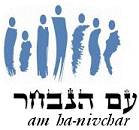
09.11.12 (Elul 24, 5772) If you are a truly "chosen person," you were chosen by the LORD God Almighty to bear the light and message of salvation, to be a "light to the nations." You were "singled out" for that purpose alone, not to feed some sense of self-importance or seek some benefit that excludes or minimizes others. Indeed, in the Kingdom of God there is no competition or rivalry, and only the "Gentiles" seek to lord their authority over one another (Mark. 10:42-45). In God's kingdom there are no "ordinary people," since each person is precious and unique. Test yourself: If you want to be great in the Kingdom of heaven, follow the Messiah and be the servant of all.
Wounded Healers...

09.11.12 (Elul 24, 5772) No one escapes suffering in this life, and therefore it is senseless to pretend to hide or deny our troubles. We are likened to "jars of clay," fragile and easily broken vessels that hold the truth of salvation; we are mere dust held together by the sustaining power and glory of God. Our frailty is intended to reveal God's sufficiency and strength: "But we have this treasure in jars of clay, to show that the surpassing power belongs to God and not to us" (2 Cor. 4:7). In light of this, the only meaningful question is how our woundedness may be used to strengthen others (2 Cor. 1:4). The "surpassing power belongs to God and not to us" means that God keeps us continually dependent upon himself; we have nothing at our own command; God alone is our strength.
Birthpangs of Messiah...
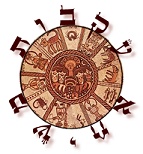
09.11.12 (Elul 24, 5772) The period of time immediately before the Messiah's arrival is sometimes called ikvot meshicha (עִקְּבוֹת מְשִׁיחַ), the time when the "footsteps of the Messiah" can be heard. This is the time appointed by God for the final redemption and the close of the present age (olam ha-zeh). According to various traditional Jewish sources (Pesachim 54b; Midrash Tehilim 9:2), no one knows the time when the Messiah will appear -- though there are some hints. God created the world in six days, each of which represents a thousand years. The seventh day is the start of the great Messianic Sabbath Rest, and therefore this age cannot last beyond 6,000 years. According to the traditional Jewish calendar, then, we are living near the end of the sixth millennium, the "Erev Shabbat" of the world. We are drawing close, in other words, to the prophesied End of Days and the appearance of Yeshua our Messiah!
The spring festivals (i.e., Passover, Firstfruits, and Shavuot) have been perfectly fulfilled in the first coming of Yeshua as Mashiach ben Yosef, and the fall festivals (i.e., Teruah, Yom Kippur, and Sukkot) will be fulfilled in His second coming as Mashiach ben David. Since the first advent fulfilled all of the spring mo'edim to the smallest of details, we believe that His second advent portends similar fulfillment as revealed in the fall mo'edim.
After the summer of harvest (John 4:35), the very first fall festival on the Jewish calendar is Yom Teruah (also called Rosh Hashanah), which is a picture of the "catching away" of kallat Mashiach (the Bride of Christ) for the time of Sheva Berachot (seven "days" of blessing that follows the marriage ceremony). Then will come the Great Tribulation and Yom Adonai - the Day of the LORD (יוֹם יְהוָה). The heavenly shofar blasts heard at Sinai will be reissued from Zion. First will be the gathering together of those who follow the Mashiach (i.e., those declared tzaddikim because of the merit of Yeshua's sacrifice), and then God's war against Satan and the world system will begin, culminating in the long-awaited coronation of the King of King of Kings - Melech Malchei Ha-Melachim (מֶלֶךְ מַלְכֵי הַמְּלָכִים).
Rosh Hashanah (or better, Yom Teruah) is therefore a sacred time that has prophetic significance for the Messianic believer, since it commemorates both the creation of the universe by Adonai as well as the "calling up" of the new creation at the behest of Yeshua, when the sound of the heavenly shofar inaugurates the anticipated End of Days (1 Cor 15:51-54; 1 Thess. 4:15-18). It also prefigures the coming Day of the LORD and Great Tribulation period that marks God's judgment on an unbelieving world...
With the appearance of the Great King comes great judgment. Let's be ready to appear before this awesome King, chaverim, by turning to Him now and trusting in His redemption and love for us... The King is coming soon; He is at the very door.
 Listen to the Shofar (click speaker icon) Listen to the Shofar (click speaker icon)
 |
The Power to Repent...
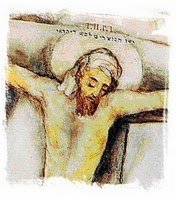
[ The following is related to the month of Elul and the "Season of Repentance"... ]
09.10.12 (Elul 23, 5772) The late Rabbi Israel Salanter, father of the Musar movement, once said, "When I was young, I wanted to change the world. I tried, but the world didn't change. So I decided to change my town, but my town didn't change. Then I resolved to change my family, but my family didn't change. Then I realized that I first had to change myself." However I would also add, "but then I realized that I couldn't change even myself, so I cried to the LORD for a new heart and He answered my plea..."
We can only truly change when we die and are brought back from the dead by the power of God. As Yeshua said, "Unless a grain of wheat falls into the earth and dies, it remains alone; but if it dies, it bears much fruit" (John 12:24). We must be spiritually reborn, remade, transformed, "metamorphosed" by the grace and love and kindness of God. This is the miracle of genuine teshuvah (repentance).
Contrary to the laws of "karma" and worldly wisdom, God helps those who can't help themselves... He delights to take the weak and broken and establish them with divine power, for the glory of His own Name. He confounds the mighty of this world with the "foolish" heart of faith. Blessed be His Name forever and ever...
כִּי־חַנּוּן וְרַחוּם יְהוָה אֱלהֵיכֶם
וְלא־יָסִיר פָּנִים מִכֶּם אִם־תָּשׁוּבוּ אֵלָיו
ki chan·nun ve·ra·chum Adonai E·lo·he·khem
ve·lo ya·sir pa·nim mi·kem, im ta·shu·vu e·lav

"For the LORD your God is gracious (channun) and merciful (rachum)
and will not turn away his face from you, if you return (shuv) to him."
2 Chron. 30:9

The Anniversary of Creation
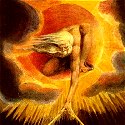
[ Note that this year, Elul 25th falls on Tuesday, Sept. 11th at sundown... ]
09.10.12 (Elul 23, 5772) Popular Judaism regards Rosh Hashanah as the date of the Creation of the universe by God (Talmud: Rosh Hashanah 27a), but the Midrash notes that it occurred six days earlier, on the 25th of Elul, when God created the Divine light by saying, "Let there be light" (Gen. 1:3-5). This is called ma'asei bereshit (מַעֲשֵׂה-בְּרִאשִׁית), the very first work of creation, which is the revelation of His Word: "And God said..." This year, the 25th of Elul occurs on Friday, September 23rd (at sundown).
The Mishnah (Sanhedrin 38b) states that Adam and Eve were created six days later on Rosh Hashanah (i.e., Tishri 1). But how did the sages determine this date? By transposing the Hebrew letters of the very first word of the Hebrew Scriptures:
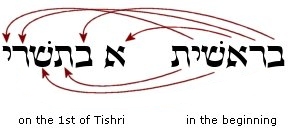 |
In other words, by rearranging the letters of the word bereshit ("in the beginning"), the phrase aleph b'Tishri ("on the 1st of Tishri") was formed, and therefore this date became associated with the anniversary of creation (or rather, the creation from Adam's perspective, i.e., the "sixth day").
According to Jewish tradition, this first "Friday" of creation was the first Rosh Hashanah, the "head of the year," since it represents the day that God began to rule as King of the Universe (i.e., melekh ha-olam: מֶלֶךְ הָעוֹלָם). When Adam first opened his eyes and human consciousness was born, he immediately understood that the LORD created all things, including himself. According to midrash, Adam's first words were, יהוה מֶלֶךְ עוֹלָם וָעֶד / Adonai malakh olam va'ed: "The LORD is King for ever and ever" (Exod. 15:18). God then said, "Now the whole world will know that I am King," and He was very pleased. This was the "tov me'od" (טוֹב מְאד) moment of creation, when God saw all that He had made "and found it very good" (Gen. 1:31). The birthday of humanity is therefore the Coronation Day for the King of the Universe. Psalm 47 celebrates the Kingship of God that mentions the "shout" (teruah) and shofar blast of God's coronation:
עָלָה אֱלהִים בִּתְרוּעָה יהוה בְּקוֹל שׁוֹפָר
a·lah E·lo·him bit·ru·ah, Adonai be·kol sho·far

"God has gone up with a shout (teruah),
the LORD with the sound of a trumpet (shofar).
Psalm 47:5

The sound of the shofar is meant to awaken our consciousness that the LORD is King of the Universe. "Wake up from your (moral) sleep. You are asleep. Get up from your slumber. You are in a deep sleep. Search for your behavior. Become the best person you can. Remember God, the One Who created you" (Mishneh Torah). "How blessed are the people who know the joyful sound (teruah), O LORD; they walk in the light of Your Presence" (Psalm 89:15).
The Midrash also says that on this very first Rosh Hashanah (i.e, the day of humanity's creation) Adam and Eve committed the fatal sin by eating from the forbidden Tree of the Knowledge of Good and Evil:
They taught in the name of R' Eliezer: On the twenty-fifth day of Elul the world was created... On the day of Rosh Hashanah, during the first hour, it occurred to His thought [i.e., to create man]; in the second, He took council with the ministering angels; in the third, He gathered together his dust; in the fourth, He kneaded him; in the fifth, He shaped him; in the sixth, He completed his form; in the seventh, He breathed into him soul; in the eighth, He placed him in the Garden; in the ninth, he was commanded; in the tenth, he transgressed; in the eleventh, he was judged; and in the twelfth, he went free.
After the LORD judged Adam and Eve, He compassionately gave them the skin of a sacrificial lamb as their covering (Gen. 3:21). This First Sacrifice, offered by the Hand of God Himself, foreshadowed the coming Sacrifice of the Lamb of God who was slain "from the foundation of the world" (1 Pet. 1:20). On the very first day of mankind's creation, then, the LORD initiated His plan of redemption and salvation through Yeshua (Jesus) as the Divine Light of the world (אוֹר הָעוֹלָם). For more on this, see the "Gospel in the Garden."
Midrash Bereshit includes the statement: "Great is teshuvah, for it preceded the Creation of the World, as it says, 'Before the mountains came into being, You reduced Man to nothingness, and said 'Return' (Psalm 90:2-3)." This idea suggests that God created humanity with the intent of ultimately revealing Himself as Redeemer and Savior. Therefore we see the Lamb of God (שֵׂה הָאֱלהִים) slain "from the foundation of the world" (1 Pet. 1:20) restoring the kingdom that was prepared for those chosen to be redeemed "before the foundation of the world" (Eph. 1:4, Matt. 25:34). The Book of Revelation likewise mentions the Book of Life of the Lamb that was slain (סֵפֶר חַיֵּי הַשֶּׂה הַטָּבוּחַ) "from the foundation of the world" (Rev. 13:8, 17:8).
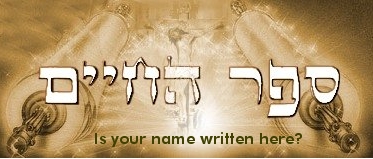 |
The Akedat Yitzchak ("Binding of Isaac") is a major theme on Rosh Hashanah. According to Jewish tradition, God told Abraham that the ram's horn (shofar) should be blown on Rosh Hashanah to remind the people of the substitutionary sacrifice provided by the LORD Himself -- an echo of the First Sacrifice offered in Eden. How much more should we as believers in the greater sacrifice of Yeshua as our Lamb of God celebrate this day?
Postcript: The LORD God of Israel is a God of order. The appointed times (moedim) were not given to Israel in vain. As Samson Raphael Hirsch once wrote, "The catechism of the Jew is his calendar." Round and round the calendar we go, waiting for God's revelation and will to be fulfilled in us.
 Listen to the Shofar (click speaker icon) Listen to the Shofar (click speaker icon)
Rosh Hashanah Alphabet...

[ The following is related to the month of Elul and the "Season of Repentance"... ]
09.10.12 (Elul 23, 5772) Some of the sages note that there are "hidden letters" in the Hebrew alphabet. For instance, the letter Aleph (א) is spelled אלף, containing the hidden letters Lamed (ל) and Pey (פּ); the letter Bet (בּ) is spelled בּית, containing the hidden letters Yod (י) and Tav (ת), and so on. As lashon hakodesh, the holy language, the name of something is thought to identify its shoresh, or its essence. Therefore the Hebrew word for man, Adam (אדם), which derives from the word for "ground" (i.e., אֲדָמָה), also means "worshiper" (מִתְפַּלֵּל), from the hidden letters in the word itself. In other words, though man was created from the dust of the ground, he was created to connect, pray, and love the Creator and King of the Universe, which is the central message of Rosh Hashanah.
But is Hebrew really "Lashon Hakodesh" (לָשׁוֹן הַקדֵשׁ), the "holy language"? Maimonides stated that Hebrew is called such because all the words of the Torah, all the prophecies and words of holiness were originally said in this language and no other - not in Aramaic, not in Greek, etc. Clearly Hebrew is the language which the LORD spoke to His prophets and to His people; in which He uttered the Ten Commandments and true prophecy, and in which He is called by the various sacred Names in the Scriptures. Yeshua spoke Hebrew and read the prophets in Hebrew at the synagogue "as was his custom" (Luke 4:16), and clearly the Apostle Paul both spoke and taught in Hebrew (Acts 17:2; 21:40; 26:14).
 Listen to the Shofar (click speaker icon) Listen to the Shofar (click speaker icon)
 |
Parashat Nitzavim - נִצָּבִים

[ Our Torah portion this week, parashat Nitzavim, is always read on the last Shabbat of the year, since it describes the process of turning (teshuvah)... ]
09.09.12 (Elul 22, 5772) Our Torah reading for the last Sabbath of the year (i.e., the Sabbath just before Rosh Hashanah) describes how Moses assembled the people, warned them to keep faith in the LORD, and then offered them the choice between life and death, blessing and curse, good and evil... Moses made a final plea to the people of Israel: bacharta ba'chayim - "Choose life!" The path of life is to love the LORD and obey His voice!
Among the Jewish sages, Nitzavim is regarded as "the" portion of the redemption of the Jewish people at the end of days, since it contains clear prophecy of the details and order of the future redemption (see Deut. 30:1-10). Of that time it is written, "And the LORD your God will circumcise your heart and the heart of your offspring, so that you will love the LORD your God with all your heart and with all your soul, that you may live."
וּמָל יְהוָה אֱלהֶיךָ אֶת־לְבָבְךָ וְאֶת־לְבַב זַרְעֶךָ
לְאַהֲבָה אֶת־יְהוָה אֱלהֶיךָ בְּכָל־לְבָבְךָ
וּבְכָל־נַפְשְׁךָ לְמַעַן חַיֶּיךָ
u·mal · Adonai · E·lo·he·kha · et · le·vav·kha · ve·et · le·vav · zar·e·kha
le·a·ha·vah · et · Adonai · E·lo·he·kha be·khol · le·vav·kha
uv·khol · naf·she·kha · le·ma·an · chai·ye·kha

"And the LORD your God will circumcise your heart and the heart of your offspring,
so that you will love the LORD your God with all your heart
and with all your soul, that you may live."
(Deut. 30:6)
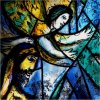
Note here the reference is to circumcision of the heart – not of the flesh – which is a metaphor for the inner miracle of teshuvah (i.e., returning to the LORD) when barriers sourrounding the heart are removed. In the context of our Torah portion, we understand this as a promise of the coming spiritual regeneration of Israel during the End of Days. During that time of great testing, God will grant Israel teshuvah regarding the Messiah Yeshua, taking away the stony heart and giving them a heart of flesh, lev chadash v'ruach chadasha - a new heart and a new spirit - so that they should truly know Him and keep His commandments (Ezek. 11:19; 36:26; Deut 32:39). May that glorious day come quickly!
The Torah portion then goes on to describe the means of the means of finding the redemption: "This commandment (i.e., turning to the LORD) is not too hard for you, neither is it far off." Indeed, it is not a matter of striving to ascend to heaven, nor of fathoming the depths of the sea. No, "the word is very near to you" (כִּי־קָרוֹב אֵלֶיךָ הַדָּבָר מְאד) - as close as your mouth and heart. That is, if we confess the truth with our mouth and turn to God with all our heart, we find blessing and life... Notice that the Apostle Paul quoted from this section (Deut. 30:11-14) in Romans 10:5-8 and applied it to the message of salvation given in Yeshua... The "word of faith" is the message that God's righteousness now comes through Messiah's work for us, and the confession of faith ascribes salvation to be "of the LORD," not on our own works of righteousness.
 |
Teshuvah and Inner Peace...
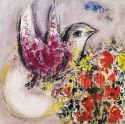
09.07.12 (Elul 20, 5772) Ultimately, teshuvah (i.e., "repentance") means surrendering your life to God as it is, that is, unconditionally abandoning yourself to His care. This is a place of rest, trust, and peace that allows the Spirit of God to work through you (Zech. 4:6). Here you can let go of your need to control, and you are set free to allow others to be what they are without making demands on them. As you let go in trust, you find comfort in God's sheltering presence... The love and acceptance you have been searching for does not come by striving to be religious, but by opening your heart to receive God's eternal promise...
לא בְחַיִל וְלא בְכחַ
כִּי אִם־בְּרוּחִי
אָמַר יְהוָה צְבָאוֹת
lo · ve·cha·yil · ve·lo · ve·ko·ach
ki · im · be·ru·chi
a·mar · Adonai · Tze·va·ot

"Not by might, nor by power, but by my Spirit,
says the LORD of hosts."
(Zech. 4:6)

Hebrew Study Card
"Hope to the LORD (קַוֵּה אֶל־יְהוָה); be strong and strengthen your heart; and (again) hope to the LORD" (Psalm 27:14). There can be no turning to God without genuine hope (תִּקְוָה). Shabbat Shalom to all you fellow "captives of hope" in our Messiah Yeshua. Stay strong - chazak - and above all else, guard your heart, for from it are the "issues of life." May Yeshua our King be lifted up, exalted, honored, extolled, magnified, and glorified always. Amen.
 Listen to the Shofar (click speaker icon) Listen to the Shofar (click speaker icon)
A Prayer for the Season...
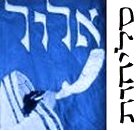
[ The following is related to the month of Elul and the "Season of Repentance"... ]
09.07.12 (Elul 20, 5772) "Help me, LORD, to search my heart and soul; teach me to be ruthlessly honest with myself... Forgive me for hiding from my faults, pretending they are not there, denying or rationalizing my choices, and sometimes even blaming others for my own mistakes. Help me take responsibility for my actions, and for hurting others through acts of selfishness. Grant me humility to ask for forgiveness from those whom I have wounded; help me make amends and repair the breach, O God. And Lord, please heal the inner wounds of my shame. If there are scars from these wounds, let me see them as tokens of your healing and kindness; transform the suffering of my life into a source of wisdom, compassion, and grace... Above all, help me turn to your love, God, for your love and acceptance is what I need most of all. In the heart of Yeshua: Amen."
 Listen to the Shofar (click speaker icon) Listen to the Shofar (click speaker icon)
Exile and Joy...
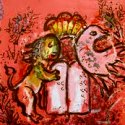
[ The following entry concerns this week's Torah reading, parashat Ki Tavo. Please read the Torah portion to "find your place" here. ]
09.07.12 (Elul 20, 5772) In our Torah portion this week (Ki Tavo) we are warned of exile if we fail to express simchah (joy) for the fruit of our lives (see Deut. 28:45-47). We are to offer our bikkurim (first fruits) from an inward store of gratitude, from a heart that recounts the history of God's deliverance (Deut. 26:1-11). We don't superficially enter into the land. Instead of attaining joy by keeping the commandments, we keep the commandments by attaining joy, which is another way of saying that faith is the essence of all true Torah. "If we do not fulfill a mitzvah with joy, we do not understand the meaning of a mitzvah."
A Chassidic story, undoubtedly influenced by the New Testament, says that Rabbi Shmelke and Rabbi Moshe Leib of Sassov were traveling on a ship when a dangerous storm arose that threatened to destroy the vessel. Rabbi Shmelke went over to the Sassover and saw that he was engaged in a joyful dance. "Why are you dancing?" asked Shmelke. "I am overjoyed at the thought that I shall soon arrive in the mansion of my Father." "I shall join you, then," said Shmelke. But the storm spent its force, and the ship reached port in safety.
Inner joy comes from entirely trusting that God loves, forgives, and accepts you... Joy and peace spontaneously arise when you realize that God knows your "story" and promises you a "happy ending." It is faith in God's personal love for you...
 |
Tzedakah and Blessing...

09.07.12 (Elul 20, 5772) Our Torah portion this week includes the duty to give the tithes to the Levites and the poor, a duty that is directly connected with the prosperity and fruitfulness of the land itself (see Deut. 26:12-15). The sages interpret "Cursed is the one who will not uphold the words of Torah" to mean that those who benefit from Torah should support those who labor in its teaching. They note that the word "uphold" (יָקִים) has the same value as "money" (כּסף), which means that the work of Torah is sustained by the tzedakah (charity) of others. This idea is repeated in the New Testament (see Gal. 6:6; 1 Cor. 9:14). Indeed, giving tzedakah is a means of expressing favor and grace from heaven, as it is written: "Open to me the gates of righteousness (tzedakah) that I may enter through them and give thanks to the LORD. This is the gate of the LORD; the righteous shall enter through it" (Psalm 118:19-20).
Note: For more on this, see "Does Torah Bake Bread?"
 |
Teshuvah and Connectedness...
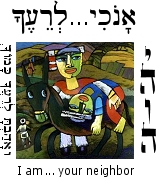
09.06.12 (Elul 19, 5772) The story is told how Rabbi Yitzchak of Berdichev once encountered a man eating on the fast day of Tishah B'Av. 'Surely you've forgotten that this is a fast day?' he asked. 'No,' answered the man, 'I know it is Tishah B'Av.' 'Ah... then you are not well and your doctor has instructed you not to fast,' said Yitzchak. 'No, I am perfectly healthy,' the man replied. R' Yitzchak lifted his eyes toward heaven, 'Look how precious your children are, dear G-d. I have provided this man with ample excuse to explain away his behavior, but he refuses to deviate from the truth, even when it incriminates him' (from Twerski: Living Each Day). I would add, whatever you do, do with all your heart...
Part of learning to see means recognizing our deep connectedness - and that we all share this frail gift and moment of life with one another. Indeed, is not spirituality a hunger for such connectedness, a sense of belonging, of being "accepted at the table," seen and appreciated as a member of God's own household? We yearn for intimacy and connection, but when these are missing, we experience alienation, pain, heartache, a sense of fracture. We reach out to touch, but no one is there... It is this void, the loss of connection, that is the source of our darkness and despair. Though I am afraid of rejection, I hunger for you - for your touch, your love, your presence... Shine your light upon us, O LORD; fill us with compassion and grace for one another. If I am overlooked, help me to see the value in the others around me; help me to help others feel welcomed and loved.
During the dreadful atrocities of the Bolshevik Revolution in Russia, thousands of bewildered suspects were randomly arrested, rounded up, stripped naked, and shot one by one in the back of the head. One eyewitness account captures the depth as well as the poignancy of our need to feel linked, joined together: "Most of the victims usually requested a chance to say good bye, and because there was no one else, they embraced and kissed their executioners" (from Richard Marius' 1991 article "What is Human Nature?"). Can you even imagine such a desperate, gut wrenching need to connect, to reach out... to belong - despite the sheer madness and depravity of others? And yet we all face death daily, and we all miss opportunities to kiss, embrace those in our life that mean so much to us. Repent one day before you die, chaverim. Do not allow relationships in your life to wither, since our connection with one another is central to who we are as a people.... God help us.
 |
A Word from the Spirit...
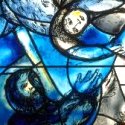
[ These words came to me as I prayed and sought the Divine Presence today... I hope they might encourage you. ]
09.06.12 (Elul 19, 5772) "I go to prepare a place for you... on the other side of this veil; the place of my secret chamber. Look into my eyes before I go; see my heart's passion: I am aflame for you, and yet I must go; I must... There is no other way but through, through the waste places, into the darkest pitch, across that chasm... But don't let your heart be troubled, for this demonstrates my love and seals my word to you forever. And though we must be apart for a season, I swear I will come again for you, to take you through this veil to be with me forever. Do not lose heart, my beloved. I am coming soon; my hand is upon the door..."
Do you have trouble receiving these words as your own? Henri Nouwen keenly wrote: "There are two realities to which you must cling. First, God has promised that you will receive the love you have been searching for, and second, God is faithful to that promise." You must believe the "yes" that comes back when you ask, "Do you love me?" You must choose this "yes" even when you do not experience it" (Inner Voice of Love). You have to trust the place that is solid, despite the gnawing sense of inner emptiness and the inevitable changes of life...
 |
How to do Teshuvah...

09.06.12 (Elul 19, 5772) We learn teshuvah by doing teshuvah... 'A man once approached R' Israel of Rizhin and said to him, 'Rebbe, I so wish to repent, but I don't know what to do.' 'And to sin, you knew what to do?' 'Yes, but that was easy. First I sinned, then I knew.' 'Exactly. Now do the same the other way around. Start by repenting; you'll know later.' As Yeshua said, "If anyone wants to do God's will, he will know..." (John 7:17).
The same is true about all the mo'edim (i.e., holidays). For instance, you learn about Passover by actively participating in a Seder, not just reading about it in a book... We know something with our whole heart when we engage our senses, our bodies, etc. through our participation, by making it "our own." The life of faith is not a "spectator sport."
It is often not what we see that matters, but what we don't see, what we overlook... We see our sin, our inability, our brokenness, but we overlook compassion, power, and healing from heaven. We must learn to see the "white spaces" between the letters, to train ourselves to see the good in every circumstance (even our struggle), to cultivate inner vision and awareness. Teshuvah means changing not only our thinking, but fixing our heart's attitude by bringing love, joy, and peace to our experience. In this way, re-learning to see is not unlike "getting down on your knees" within yourself as you encounter the world around you. It is a way to "practice the presence" of Messiah at all times...
 |
Kuma Na - Please arise!

[ The following entry concerns this week's Torah reading, parashat Ki Tavo. Please read the Torah portion to "find your place" here. ]
09.05.12 (Elul 18, 5772) It was an old custom that on the Saturday night before Rosh Hashanah, just a few minutes before midnight, the town shamash would go through the neighborhood, rapping three times on each door shouting, Kuma na! - "Please arise to serve the Creator!" And everyone would quickly assemble for selichot (i.e., penitential) prayers. The appeal to the revelation of the Name YHVH (יהוה) and the 13 attributes of God's mercy is the central theme of the midnight prayer service...
Contrary to what you might expect, the recitation of the traditional selichot (i.e., the 'A' to 'Z' confession of sins) is recited with joy, based on a passage from our Torah portion this week which says that we are punished "because we did not serve God with rejoicing and a full heart" (Deut. 28:47). The essence of joy is a sense of well-being and gratitude that comes from trusting in God's love. This is implied in the bikkurim (firstfruits) ceremony that begins the portion. We are commanded to take our "first fruits," go to the Temple, and express our thanks: ve'samachta bekhol ha-tov asher natan lekha (וְשָׂמַחְתָּ בְכָל־הַטּוֹב אֲשֶׁר נָתַן־לְךָ) - "you will celebrate for all the good God has given you" (Deut. 26:11).
יְהוָה יְהוָה אֵל רַחוּם וְחַנּוּן
אֶרֶךְ אַפַּיִם וְרַב־חֶסֶד וֶאֱמֶת
נצֵר חֶסֶד לָאֲלָפִים
נשֵׂא עָוֹן וָפֶשַׁע וְחַטָּאָה וְנַקֵּה לא יְנַקֶּה
פּקֵד עֲוֹן אָבוֹת עַל־בָּנִים
וְעַל־בְּנֵי בָנִים עַל־שִׁלֵּשִׁים וְעַל־רִבֵּעִים
Adonai Adonai El ra·chum ve·chan·nun
e·rekh ap·pa·yim ve·rav che·sed ve·e·met
no·tzeir che·sed la·a·la·fim
no·sei a·von va·fesh·a ve·cha·ta·ah ve·nak·keh lo ye·nak·keh
po·keid a·von a·vot al ba·nim
ve·al be·nei va·nim al shil·le·shim ve·al rib·bei·im

"The LORD, the LORD, a God merciful and gracious,
slow to anger, and abounding in steadfast love and faithfulness,
keeping steadfast love for thousands,
forgiving iniquity and transgression and sin, but who will by no means clear the guilty, visiting the iniquity of the fathers on the children
and the children's children, to the third and the fourth generation"
(Exod. 34:6-7)

Ultimately we find lasting joy when we trust that we are truly loved, forgiven, and accepted -- despite the long litany of our sins... Therefore we find consolation and joy in the salvation given in Yeshua our LORD, who gave up His life so that we could be accepted by God.
Repentance and Paradox...
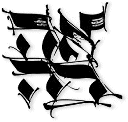
[ The following is related to the month of Elul and the "Season of Repentance"... ]
09.05.12 (Elul 18, 5772) To be a human being is a paradox, caught between the realms of the infinite and nothingness; a union of endless possibility yet terminating limitation. Man desires to live forever but is conscious that one day he will die. He is an incongruity - a mix of flesh and spirit, saint and sinner, good and evil, angel and animal... A spirituality that demands for us to be always happy, always "up," is therefore dishonest, since the truth is grounded in what is real, and that includes both the miserable and the tragic as well as the joyful and sublime. It's not that there is no difference between good and evil within the heart, but both are part of who we really are. It is the bittersweet struggle, the process of walking as "saintly sinners," "holy fools," "dying immortals," and so on, that defines us. We must embrace our brokenness, in order to become whole; there is no healing without true confession of our need. Therefore we come to the paradoxical cross - the place of utter pain, separation, and death - to find atonement, acceptance and life.
Please note this is not to deny that we are to walk by the Spirit and reckon ourselves dead to sin in the Messiah (Rom. 6:11); however, far from being a sign of a lack of spirituality, personal struggle is a sign of its real presence.... Only those who are conscious of the tragic, who are haunted by the disparity between what "is" and what "ought" to be; only those who are divided within themselves, torn by inner tension and conflict - those aware that they are both in this world but not of it - sojourners, a long long way from home, homesick for the heavenly city, who inwardly ache and yearn to be fully redeemed - only these, it may be said, are genuinely spiritual. After all, the worldling, the self-confident and self-possessed, rarely desire deliverance from themselves and are often content to rationalize the state of their soul; the spiritual person, on the other hand, senses a profound incompletion, a lack, a fracture that runs straight through the core of reality, a breach that needs to ultimately be healed...
There is great joy, of course, and we are indeed to "rejoice in the Lord always," but there is also real pain in our lives, and I'd rather be in a bar with a person crying into their beer over the mess they've made of their lives than with a self-righteous prig who thinks they've got it all together... "We are treated as impostors, and yet are true; as unknown, and yet well known; as dying, and behold, we live; as punished, and yet not killed; as sorrowful, yet always rejoicing; as poor, yet making many rich; as having nothing, yet possessing everything" (2 Cor. 6:8-10).
Personal Note: I want to express my heartfelt appreciation to each of you who stand with this ministry and encourage me to continue... You are in my prayers, and may it please the LORD our God to draw you ever closer to Him through the grace we have in Yeshua our glorious Savior. Amen.
 |
Teshuvah and Self-Justification

[ The following is related to the month of Elul and the "Season of Repentance"... ]
09.05.12 (Elul 18, 5772) When we look for approval or admiration from others, we are vainly trying to justify ourselves. We attempt to manage appearances by trying to make ourselves look right and good - especially to ourselves. This heart attitude is expressed by the "prayer" of the Pharisee: "God, I thank you that I am not like other men..." (Luke 18:11). The truth, however, is irrepressible, and therefore it requires more and more energy to keep up the inner masquerade. Secretly congratulating yourself because of the rightness of your religious belief or practice is another way to be seduced into self-justification. Test yourself: Are you really satisfied with God's love, or do you want something more?
The Blessing of Struggle...

[ The following is related to the month of Elul and the "Season of Repentance"... ]
09.05.12 (Elul 18, 5772) Recently I mentioned that we are part of a seemingly endless journey of falling down and getting back up once again. It is this struggle, this "good fight of faith," that eventually ennobles the heart and establishes character... The hidden blessing of our repeated failure, then, is that we attain genuine humility as we rely on God for the miracle of deliverance. When we draw near to God in confession of our weakness, we may discover that our struggle disguises unacknowledged need within. For example, we might wrestle with sexual lust, but this may come from refusing to trust others or because we are harboring resentment... "Hurt people hurt people," which means that often our sins come from a place of inner pain of abandonment. When we confess the truth we are enabled to draw close to God - the God of Truth - to discover his mercy. Those things you believe make you unlovable are the very means by which God manifests the glory of His compassion and love for you. "It is not judgment that breaks the heart, but mercy and love."
This is why during the month of Elul and the High Holidays we recite prayers for forgiveness (i.e., selichot) in the plural, listing all the sins from "A" to "Z" that we (collectively) have committed. We use plural pronouns out of a sense of compassion... We are one body. When some part of the body is sick, the whole body is sick; when one of us sins, he hurts all the flock (1 Cor. 12:26). Therefore the traditional selichot prayer mentions all the possible sins in the order of the Hebrew alphabet: Ashamnu, "we have sinned," begins with the letter Aleph; Bagadnu, "we have been false," begins with Bet; Gazalnu, "we have robbed," begins with Gimmel, and so on... Just as Yeshua taught us, "Avinu She'bashamayim" - our Father, forgive us of our sins, so "all Israel is responsible one for another." "Compassion" means that others' sins and failures don't make them different from us, but rather more like ourselves. It is "feeling with" the heart for the sake of the other in empathy....
The Rabbi of Lelov said to his Hasidim: "A man cannot be redeemed until he recognizes the flaws in his soul and tries to mend them. A nation cannot be redeemed until it recognizes the flaws in its soul and tries to mend them. Whoever permits no recognition of his flaws, be it man or nation, permits no redemption. We can be redeemed to the extent to which we recognize ourselves. When Jacob's sons said to Joseph, "We are upright men," he answered: "That is why I spoke to you saying, 'You are spies.'" But later, when they confessed the truth with their lips and with their hearts, and said to one another, 'We are verily guilty concerning our brother,' the first gleam of their redemption dawned. Overcome by compassion, Joseph turned aside and wept." - Martin Buber (Tales of the Hasidim)
Dangers of False Humility...

[ The following is related to the month of Elul and the "Season of Repentance"... ]
09.04.12 (Elul 17, 5772) Isaac of Thebes was visiting a community when he saw a brother sin. Isaac condemned him in his heart. Later, when he returned to his room for the night, he discovered an angel barring the doorway. "God has sent me to ask you where he is to put the fallen brother whom you have condemned." Isaac was immediately contrite: If God did not judge the sinner, how could he? (Sayings of the Desert Fathers)
If you call yourself a sinner, be sure you understand the implications... If you say, "I know that I am the problem, that my heart is foolish, that I am hotheaded, and that my troubles are my own doing," then examine your anger and disappointment with others in your life... The genuineness of your humility (and indeed your faith) may be revealed by how you handle disappointment, frustration, being disregarded, and so on. If you say that you are "just a poor sinner saved by grace," then test whether you really believe this is true....
There's an old native American story about a young boy who died of a snake bite. The poison took away his life, and his grieving parents carried his body to the holy man and laid it before him. And the three of them sat around the body sadly for a long, long time. The father finally rose from his grieving, went over to his child, stretched out his hands over the feet of the child and said, "In all my life I have not worked for my family as I should have." And the poison left the feet of the child. Then the mother arose and said, "In all my life I have not loved my family as I should." And the poison left the heart of the child. And the holy man stretched out his hands over the head of the dead boy saying, "In all my life I have not believed the words I have spoken." And the poison left the head of the child. The child then rose up, and the parents and the holy man rose up, and the village greatly rejoiced that day (adapted from Bausch: A World of Stories).
 Listen to the Shofar (click speaker icon) Listen to the Shofar (click speaker icon)
Teshuvah and Seeking...
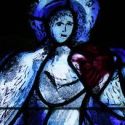
[ The following is related to the month of Elul and the "Season of Repentance"... ]
09.04.12 (Elul 17, 5772) The Hebrew word for "world" or "age" is olam (עוֹלָם), which is derived from a root verb (עָלַם) that means "to conceal" or "to hide." God "hides" His face from us so that we will seek Him, and that means pressing through ambiguity of this world to discern and take hold of the truth. Therefore King David said, בַּקְּשׁוּ פָנָיו תָּמִיד/ bakeshu fanav tamid: "Seek His face continually" (Psalm 105:4). Note that the Hebrew gematria (numerical value) for the word "fanav" (i.e., "His face") is the same as that for the word "olam." When we truly seek God's face (i.e., His Presence) we are able to discern the underlying purpose for our lives in this age.
דִּרְשׁוּ יְהוָה וְעֻזּוֹ
בַּקְּשׁוּ פָנָיו תָּמִיד
dir·shu · Adonai · ve·u·zo
ba·ke·shu · fa·nav · ta·mid

"Seek the LORD and his strength;
seek his presence continually."
(Psalm 105:4)
ζητήσατε τὸν κύριον καὶ κραταιώθητε
ζητήσατε τὸ πρόσωπον αὐτοῦ διὰ παντός

Hebrew Study Card
The ancient Greek version of the Torah (i.e., the Septuagint) translates this verse, "Seek the LORD and be strengthed; seek His face through everything (διὰ παντός)." The LORD God gives us "inner strength" (i.e., ἐγκράτεια, from εν-, "in" + κράτος, "strength" or "power") when we yield to "the power of His might" (ἐν τῷ κράτει τῆς ἰσχύος αὐτοῦ) (Gal. 5:22-23; Eph. 6:10). Therefore we must remember God's power and glory, for "He is the LORD our God (הוּא יְהוָה אֱלהֵינוּ); His judgments are in all the earth" (Psalm 105:7).
 Listen to the Shofar (click speaker icon) Listen to the Shofar (click speaker icon)
As Close as your Breath...

[ The following is related to the month of Elul and the "Season of Repentance"... ]
09.04.12 (Elul 17, 5772) Teshuvah is our answer to God's invitation to be his beloved people... Were it not for this great gift, no one could ever withstand the force of the divine attribute of Justice. The Torah describes the process of turning: "This commandment (i.e., of turning to the LORD) is not too hard for you, neither is it far off." Indeed, it is not a matter of striving to ascend to heaven, nor of fathoming the depths of the sea. No, the word is very near to you (כִּי־קָרוֹב אֵלֶיךָ הַדָּבָר מְאד) - as close as your mouth and heart. If we confess the truth with our mouth and turn to God with all our heart, we find blessing and life:
כִּי הַמִּצְוָה הַזּאת אֲשֶׁר אָנכִי מְצַוְּךָ הַיּוֹם
לא־נִפְלֵאת הִוא מִמְּךָ וְלא רְחקָה הִוא
כִּי־קָרוֹב אֵלֶיךָ הַדָּבָר מְאד
בְּפִיךָ וּבִלְבָבְךָ לַעֲשׂתוֹ
ki · ha·mitz·vah · haz·zot · a·sher · a·no·khi · me·tza·ve·kha · ha·yom
lo · nif·let · hi · mi·me·kha · ve·lo · re·cho·kah · hi
ki · ka·rov · e·le·kha · ha·da·var · me·od
be·fi·kha · u·vil·vav·kha · la·a·so·to

"For this commandment that I command you today
is not too hard for you, neither is it far off...
For the word is very near you -
it is in your mouth and in your heart, so that you can do it"
(Deut. 30:11,14)

It is interesting to consider how the Apostle Paul interprets Deut. 30:11-14 in Romans 10:5-8 and uses it to contrast the "righteousness which is from the law" with the "righteousness which is of faith." Paul first quotes Lev. 18:5 as a summary of the meaning of the law (you must keep the commandments in order "to live by them," i.e., you must entirely obey them to find life). He then contrasts the "righteousness which is from the law" with the "righteousness which is of faith." Only God can bridge the gap between heaven and earth. When Paul quotes Deut. 30:14, i.e., "But the word is very near you. It is in your mouth and in your heart," he omits the last clause (i.e., "so that you can do it") precisely because we cannot "do it," i.e., keep the commandments. The "word of faith" is the message that God's righteousness now comes through Messiah's work for us, and the confession of faith ascribes salvation to be "of the LORD," not based on our own works of righteousness.
 |
Teshuvah of Concern...

[ The following is related to the month of Elul and the "Season of Repentance"... ]
09.04.12 (Elul 17, 5772) Blaise Pascal wrote that Christianity is essentially a confession of irreparable human infirmity, and therefore its message is always directly there - to the place of our pain and hopelessness. Consequently it has no voice or message to mere triflers - to those who might patronize it as philosophically interesting, morally edifying, poetically beautiful, politically useful, and so on. No, no, never: the Spirit speaks to the heart in its anguish, in its lament over the suffering and agony of life in this world, and there breathes out the haunting question, "Do you now believe?"
עָקב הַלֵּב מִכּל וְאָנֻשׁ הוּא
מִי יֵדָעֶנּוּ
a·kov · ha·lev · mik·kol · ve·a·nush · hu
mi · ye·da·en·nu

"The heart is deceitful above all things, and incurably sick;
who can understand it?"
(Jer. 17:9)
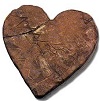
Though the Christian faith can be expressed in theological terms, it remains first of all a message to the individual in existential distress, shouting the way of escape to those on the edge of the everlasting abyss... The language of genuine teshuvah is one of ultimate concern, a message that appeals to matters of life and death itself.
"A life of a human being begins with the illusion that a long, long time and a whole world lie before him in the distance, begins with the foolhardy delusion that he has such ample time for his many claims. The poet is the eloquent and enthusiastic confidant of this foolhardy but beautiful delusion. But when a person in the infinite transformation discovers the eternal itself so close to life that there is not the distance of one single claim, of one single evasion, of one single excuse, of one single moment of time from what he in this instant, in this second, in this holy moment shall do - then he is on the way..." (Kierkegaard: Works of Love)
Enduring Ourselves...

[ The following is related to the month of Elul and the "Season of Repentance"... ]
09.03.12 (Elul 16, 5772) Spirituality is lived now, in this world... "I do not ask that you take them out of the world, but that you keep them from the evil one" (John 17:15). We are "in but not of" the world; we are part yet also not part of it... This is the tension of living in the realm of the "already-not-yet." We are haunted by a sense of incompletion - a yearning for the fulfillment of our salvation, an inner ache that helps focus the heart's affections...
A paradox of the spiritual life is that we must descend to ascend... We all sin; we all fall short. First we must accept our own "dark side" -- our own sinful nature -- before we can ever come to know the light... This is the path of confession - acknowledging the truth about who we really are, which is the only way we can learn to "endure ourselves" and eventually let go of our shame. We find ourselves when we give up our defenses and take hold of God's compassion. We all have our sins; now we must find our courage in God's love.
כִּי־פְשָׁעַי אֲנִי אֵדָע
וְחַטָּאתִי נֶגְדִּי תָמִיד
ki · fe·sha·ai · a·ni · e·dah
ve·chat·ta·ti · neg·di · ta·mid

"For I know my transgressions,
and my sin is ever before me"
(Psalm 51:3)

We must learn to "endure ourselves..." We can't deny who we are; we can't pretend to be what we are not. The root of shame is self-rejection. This is the hidden anguish of heart that leads many of us astray. As Henri Nouwen said, "There are two extremes to avoid: being completely absorbed in your pain and being distracted by so many things that you stay far away from the wound you want to heal." We don't come to the cross to destroy ourselves but to find deliverance and life: our brokenness is a means to this greater end. We "take up the cross daily," which means learning to forgive and endure ourselves... As Tillich reminds us: "The courage to be is the courage to accept oneself as accepted in spite of being unacceptable..."
In this age, we are part of a seemingly endless journey of falling down and getting back up once again. It is this struggle, this "good fight of faith," that eventually ennobles the heart and establishes character... In light of this, we must refuse to lose heart when things appear to be going badly, and likewise we must remain vigilant when things seems to be going well. The goal of the process is always to be in heartfelt, genuine, and earnest relationship with the LORD. As Madame Guyon once wrote, "You are born into the world like an illegitimate child who has no idea who his father is. But God comes and draws you out of your old life. He cleanses you and gives you back your innocence."
 |
Religion vs. Spirituality....

09.03.12 (Elul 16, 5772) Regarding the contrast between "religion" and "spirituality," Carl Jung once wrote: "One of the main functions of formalized religion is to protect people against a direct experience of God." The use of rituals, ceremonial laws, customs, the establishment of a hierarchy of believers (i.e., professional clergy), and so on, devises a layer or buffer to avoid personal encounter with God... As Kierkegaard once said, "The most pernicious of all evasions is—hidden in the crowd, to want, as it were, to avoid God's inspection of oneself as a single individual, avoid hearing God's voice as a single individual, as Adam once did when his bad conscience fooled him into thinking that he could hide among the trees" (Upbuilding Discourses). Likewise religious dogma (or theology) can create a belief system that encourages a sense of "us" against "them" that leads to the quintessential prayer fo the hypocrite: "God, I thank you that I am not like other men are" (Luke 18:11). Again Kierkegaard astutely notes that theologizing can serve to excuse people from the duty to live in genuine faith: "All this interpreting and interpreting and scholarly research and new scholarly research that is produced on the solemn and serious principle that it is in order to understand God's Word properly -- look more closely and you will see that it is in order to defend oneself against God's Word. It is only all too easy to understand the requirement contained in God's Word" (For Self-Examination).
 |
Man-made religion establishes fixed practices, often based on rationality, with a goal of attaining a state of perfection of some kind. Rewards and punishments are emphasized to keep the system running. Other religious expressions are considered threatening on some level, at least from the perspective of those who have power within the religious system itself.... Openness, uncertainty, questioning, are generally discouraged, and the role of paradox, wonder, and mystery are set aside for doctrines. All this is dangerous to the way of the Spirit. As Gregory of Nyssa said, "Concepts create idols; only wonder comprehends anything. People kill one another over idols; wonder makes us fall to our knees."
The Mystery of Spirit...

09.03.12 (Elul 16, 5772) The word "spirit" points to wonder, to something extraordinary and beyond our expectation, that is, to the mysterious Divine Presence that pervades all things yet rises above all things. Yeshua likened the Ruach (רוּחַ) with the inscrutable motions of the wind: "The wind blows where it wishes, and you hear its sound, but you do not know where it comes from or where it goes. So it is with everyone who is born of the Spirit" (John 3:8). We see the effect of the wind, but not the wind itself, which illustrates that the wind is ultimately beyond our grasp and control. To be "born of the Spirit" is therefore a mysterious intervention from heaven (John 1:13), just as being "led by the Spirit" implies seeing differently, that is, apprehending the Divine Presence in the mysterious motions of life.
אָנָה אֵלֵךְ מֵרוּחֶךָ וְאָנָה מִפָּנֶיךָ אֶבְרָח׃
a·na · e·lekh · me·ru·che·kha · ve·a·na · mi·fa·ne·kha · ev·rach

"Where shall I go from your Spirit?
Or where shall I flee from your presence?"
(Psalm 139:7)

"The wind blows where it will; you are aware of its soughing, but no one knows whence it comes or whither it goes. So also with longing, the longing for God and the eternal, the longing for our Savior and Redeemer. Comprehend it you cannot, nor should you; indeed, you dare not even want to attempt - but you are to use the longing. Would the merchant be responsible if he does not use the opportune moment; would the sailor be responsible if he does not use the favorable winds - how much more, then, is the one who does not use the occasion of longing when it is offered" (Kierkegaard: Discourses).
Parashat Ki Tavo - כי־תבוא

[ The following entry concerns this week's Torah reading, parashat Ki Tavo. Please read the Torah portion to "find your place" here. ]
09.02.12 (Elul 15, 5772) Our Torah portion describes a special ceremony invoking blessings and curses based on the people's adherence to the terms of the Sinai Covenant. Despite his intercession for Israel, however, Moses also delivered the tochechah (prophetic rebuke), foreseeing the people's eventual apostasy and their exile from the land...
The portion includes these words: "Because you did not serve the LORD your God with joyfulness and gladness of heart (בְּשִׂמְחָה וּבְטוּב לֵבָב) ... you shall serve your enemies whom the LORD will send against you" (Deut. 28:47-48), which the sages interpreted to mean that the source of all rebuke is the failure to serve the LORD without heartfelt joy. In other words, joy is a requirement for serving the LORD, and true happiness is always found in the grace He supplies to do His will. Indeed, the Greek word for joy used in the New Testament (χαρα) is related to the word for grace (χαρις), implying that there is a connection between apprehending grace and experiencing joy (Phil. 4:4).
Note that each curse was to be ratified by saying "Amen." The word "amen" (אָמֵן) comes from the verb aman (אָמַן), meaning to confirm, establish, or uphold. The word for "faith" (i.e., emunah: אֱמוּנָה) comes from the same root, as does the word for "truth" (i.e., emet: אֱמֶת). "Amen" is therefore an affirmation and confession of the truth: "Let it be so!" The Jewish sages say that "amen" serves as an declaration of the Kingship of God (often said quietly before the reciting the Shema) that may be understood as an acronym for the phrase El Melekh Ne'eman (אֵל מֶלֶךְ נֶאֱמָן), "God (אֵל) is a faithful (נֶאֱמָן) king (מֶלֶךְ)."
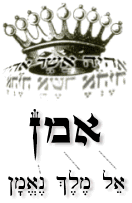 |
The Kol Dodi notes that during the brit ben ha-betarim (בְּרִית בֵּין הַבְּתָרִים), the "covenant of the parts" (Gen. 15:9-21), God told Abraham that his offspring would suffer 400 years of exile and harsh servitude, culminating in the great Exodus. Israel would then be in the desert for another 40 years, for a total of 440 years. The numeric value of Ki Tavo (כי־תבוא), "when you enter," is 439. So exactly after 439 years - that is, in the 440th year - Israel would enter the land... God's purposes and plans are always exactly on time...
The Tochechah
The "Tochechah" (תּוֹכָחָה), or God's stern warning to the Jewish people of what would befall them if they turned away from His commands, appears twice in the Torah: first in parashat Bechukotai (i.e., Lev. 26:14-46), and again in Ki Tavo (Deut. 28:15-68). Ezra the Scribe arranged the Torah reading schedule so the first would be recited (in an undertone) during Shavuot (i.e., the anniversary of the giving of the Torah at Sinai), and the second would be recited just before Rosh Hashanah (in anticipation of the date when Moses brought down the second set of tablets on Yom Kippur). The sages infer that the two tochechot foretell the destruction of both Temples and the two subsequent exiles, the second exile continuing until all Israel returns to the LORD in the end of days (see Deut. 30:1-5).
 |
|






















































































